Chapter Twelve: In The End (A Stronger Loving World)
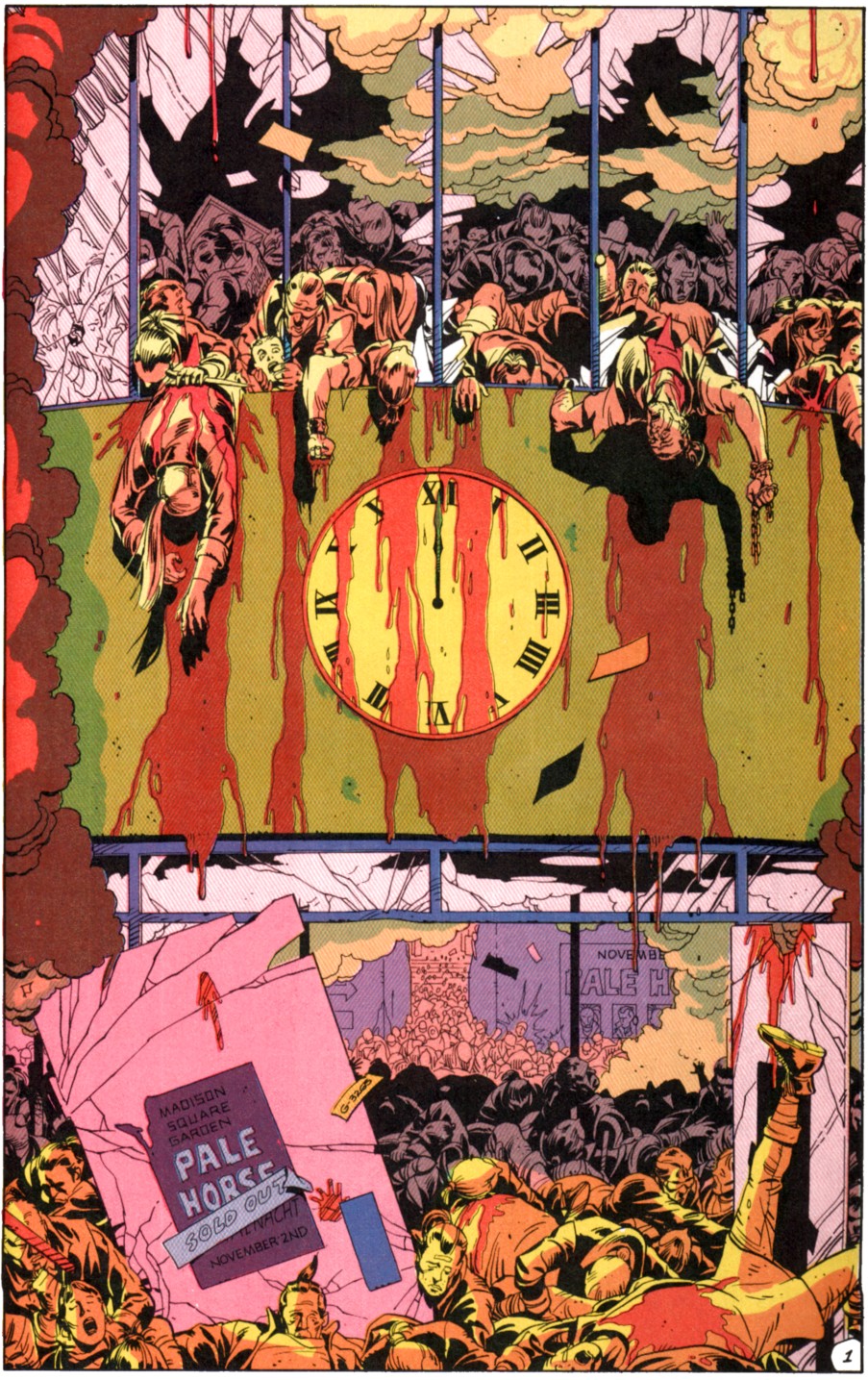 |
AND |
SO |
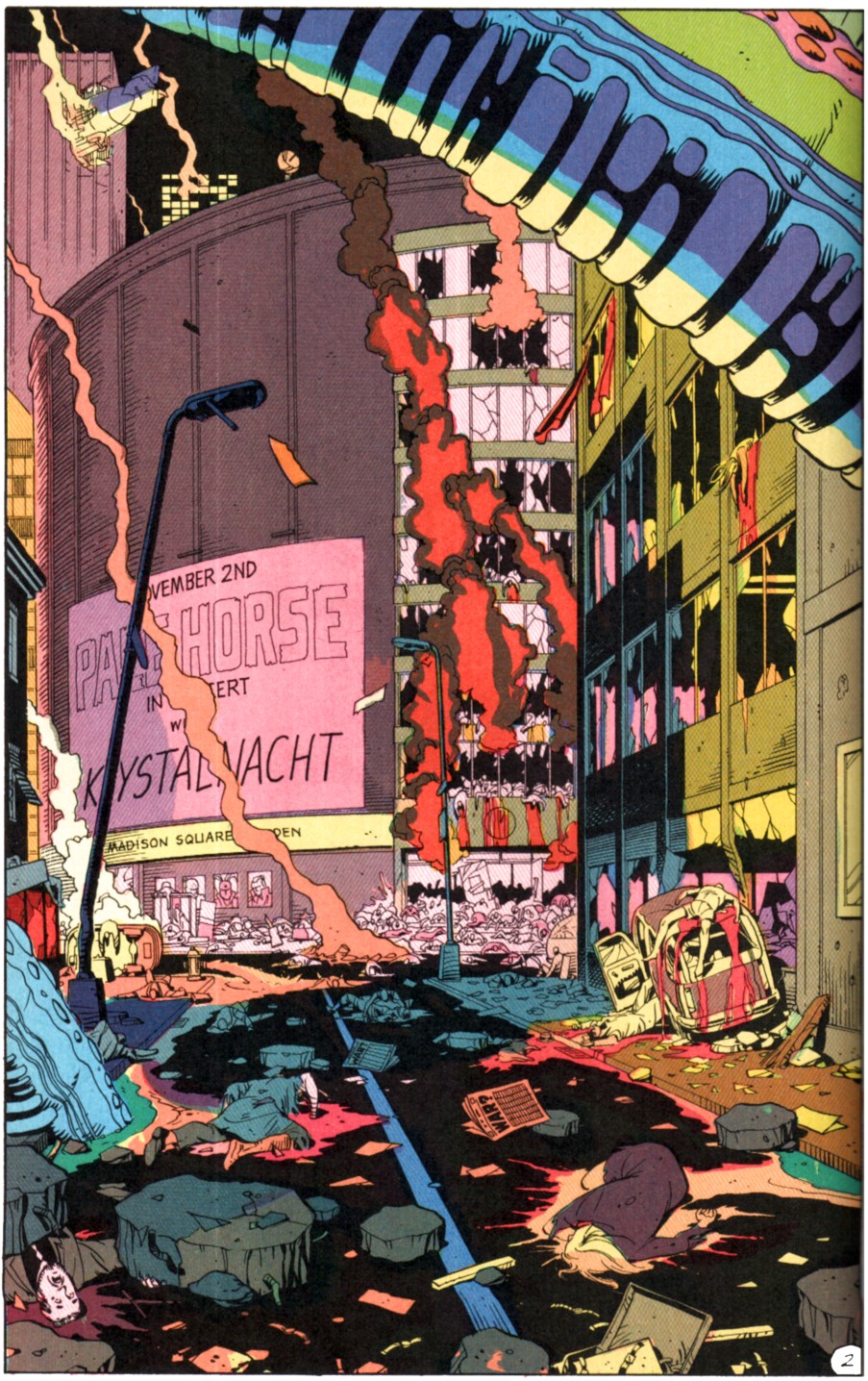 |
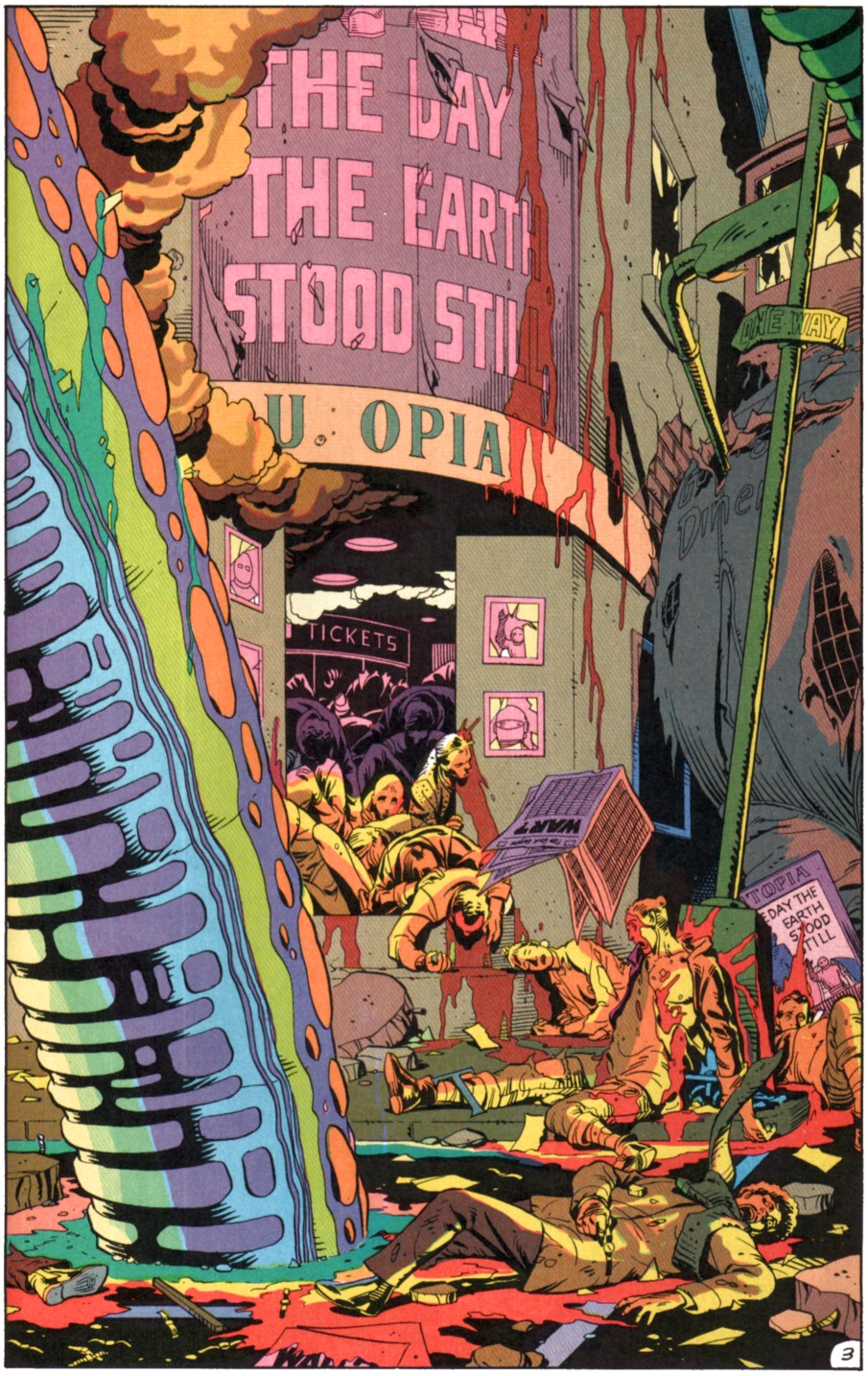 |
THEY |
FOUGHT |
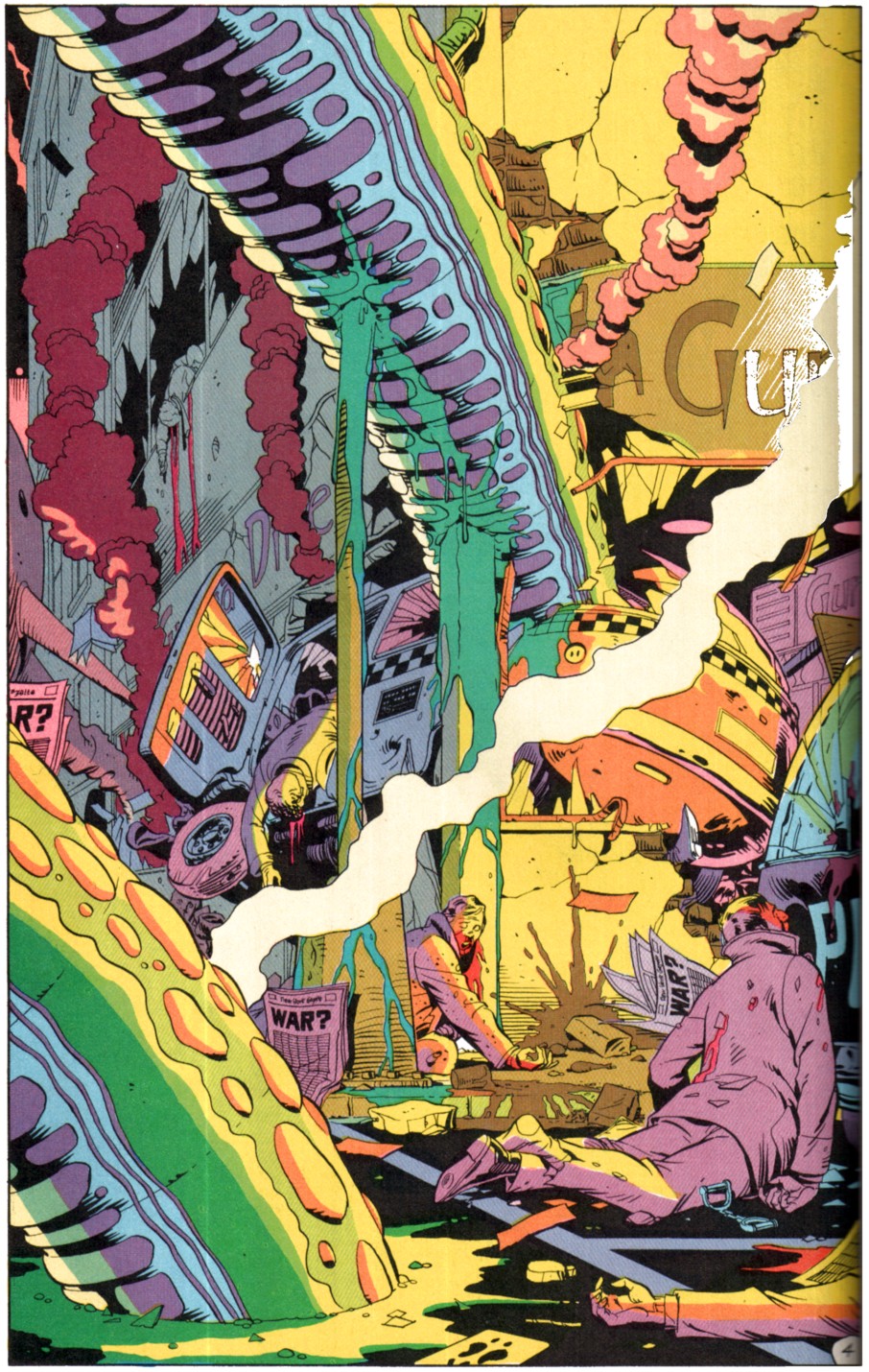 |
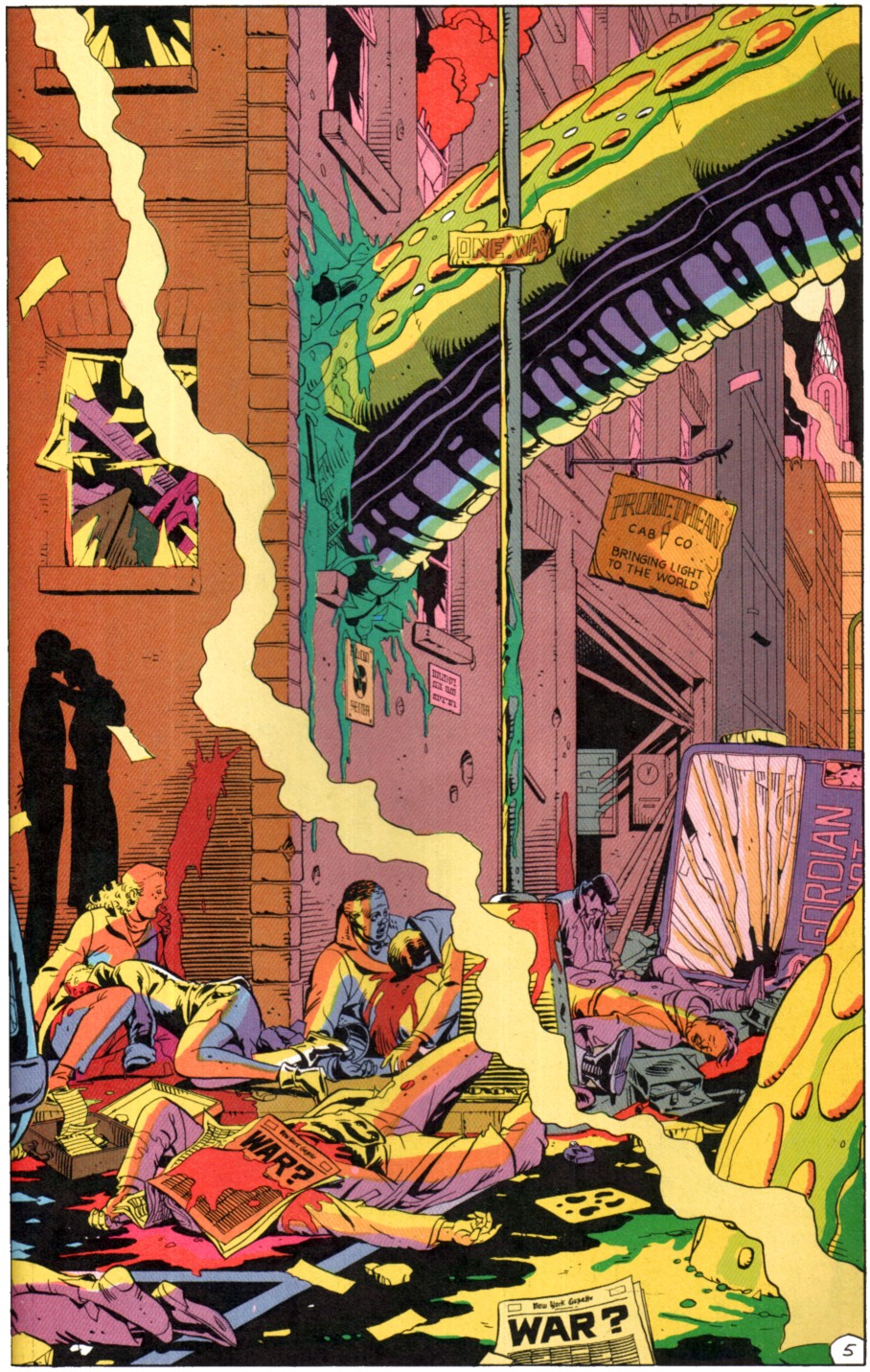 |
A |
WAR |
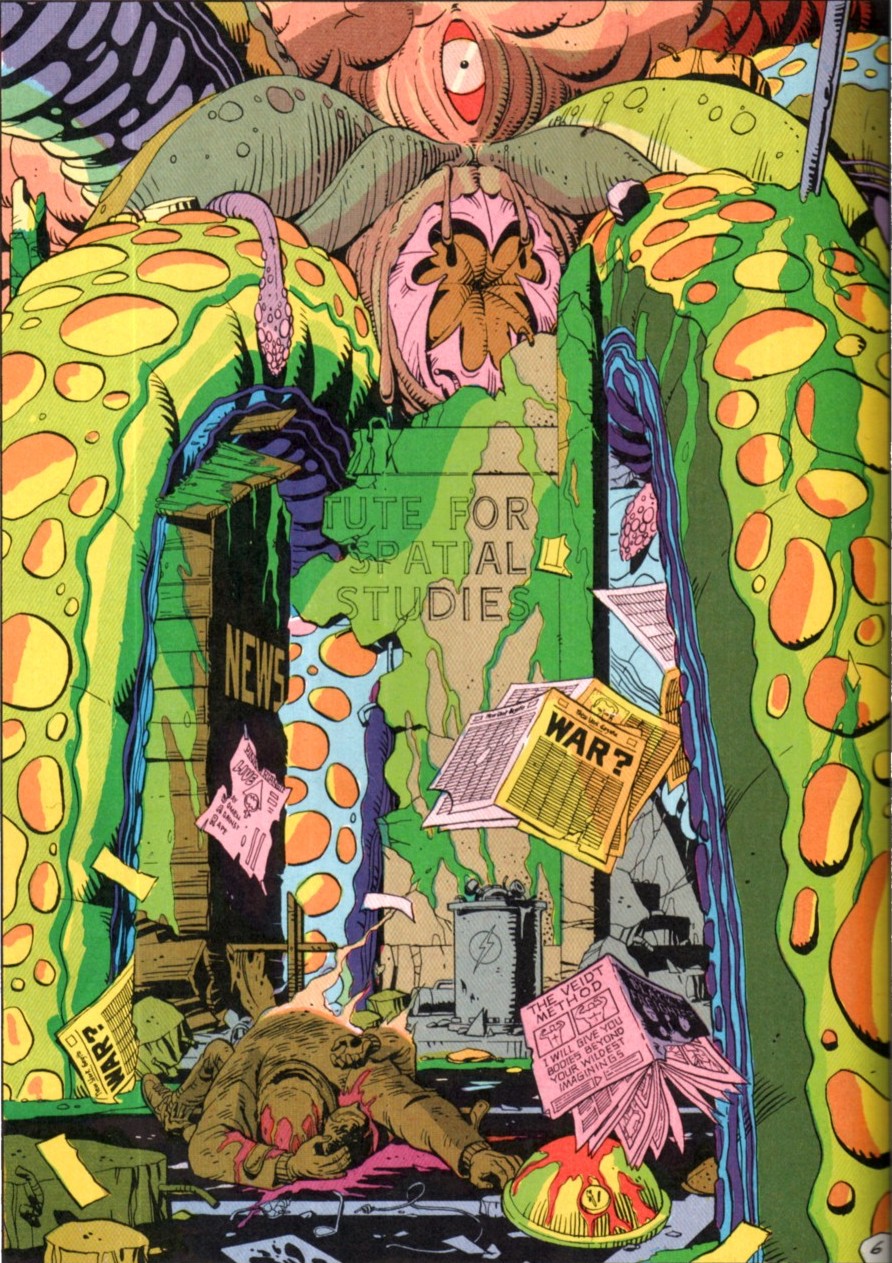 |
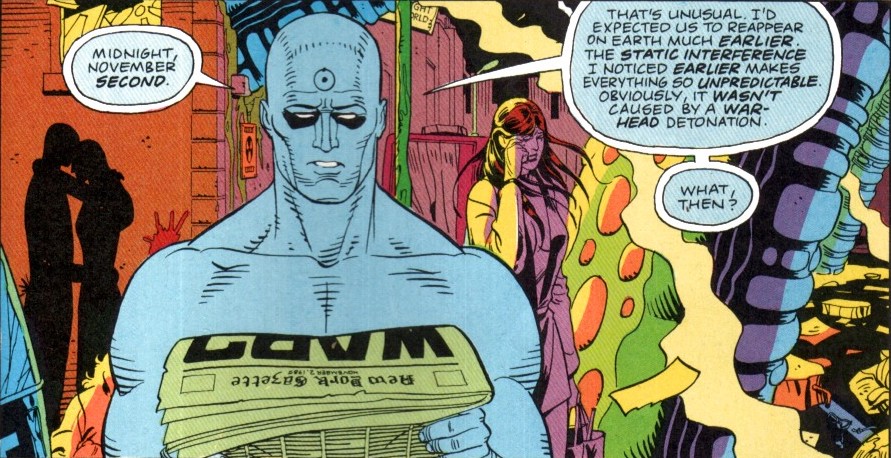 It must be said that Moore was in no way prepared for this development, and indeed would be both slow and reluctant to adjust to the reality that he was now engaged in an elaborate magical War. As discussed at length, he reached the end of Watchmen with a sense of entirely understandable exhaustion, given that it was the culmination of a genuinely staggering period of nonstop deadline-based productivity. But even if one were to take Swamp Thing, Marvelman, V for Vendetta, The Ballad of Halo Jones, Captain Britain, and the wealth of other material Moore created in the five years prior to its completion, Watchmen alone would justify a sense of exhaustion.
It must be said that Moore was in no way prepared for this development, and indeed would be both slow and reluctant to adjust to the reality that he was now engaged in an elaborate magical War. As discussed at length, he reached the end of Watchmen with a sense of entirely understandable exhaustion, given that it was the culmination of a genuinely staggering period of nonstop deadline-based productivity. But even if one were to take Swamp Thing, Marvelman, V for Vendetta, The Ballad of Halo Jones, Captain Britain, and the wealth of other material Moore created in the five years prior to its completion, Watchmen alone would justify a sense of exhaustion.
It is not merely that Watchmen is a complex and difficult work. Rather, it is that Watchmen is a work that attempts to fully reimagine the medium, industry, and its potential. As Kieron Gillen puts it, “Watchmen is a philosophical statement of how you should be able to read comics”—an attempt to force what he called for in “Writing for Comics” when he wrote that “comics have a capacity for effect that they haven’t begun to take advantage of, and are held back by narrow and increasingly obsolete notions of what constitutes a comic story. In order for comics to move forward as a medium, these notions must change.” Watchmen is an effort to force the issue—a naked and unabashed attempt to change the world that faltered only by doing so in a completely different manner than Moore intended.
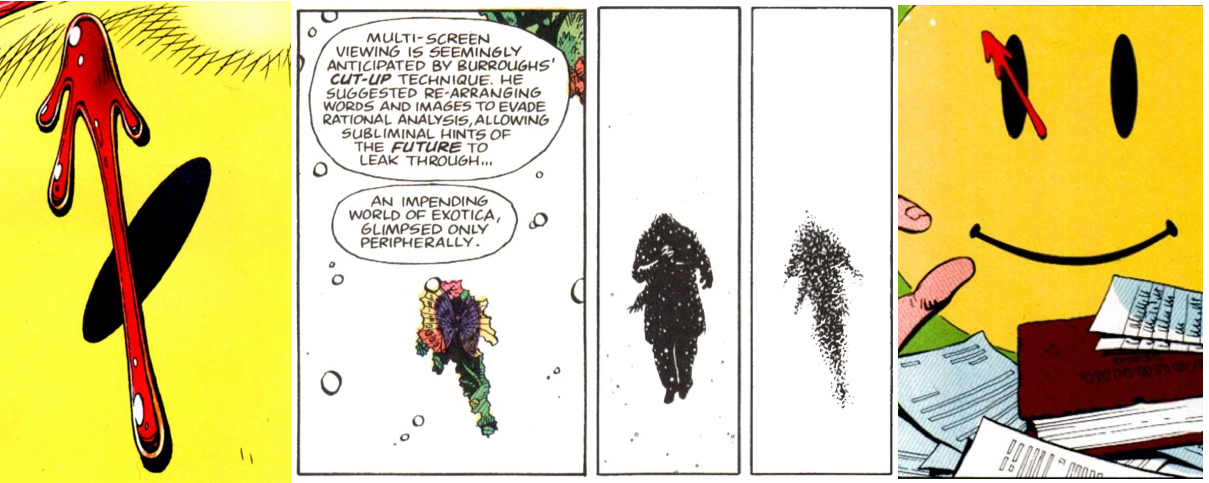
The heart of Moore’s intended revolution comes in the way in which it creates its sense of scope and magnitude. Some of these things have already been discussed—Moore’s overlapping narrative strands and use of recurring imagery and iconography, for instance, so that the iconic blood splatter on the Comedian’s badge reappears as the final disintegrating wisp of smoke in which the embracing Bernards are incinerated at the end of issue #11. But a more fundamental aspect of the comic’s vastness emerges out of the particular way in which Moore employs the nine panel grid. Watchmen has been described by numerous critics as being “clockwork,” but few actually articulate precisely what this means beyond the straightforward. Nevertheless, it’s apt. The nine panel grid means that the individual units of storytelling within Watchmen are small. More to the point, however, Moore makes the actions within them small. The iconic finger break sequence in issue #1 is a mission statement to this effect—a viscerally impactful demonstration that small actions can portray violence just as well and even better than ostentatious and exaggerated action sequences.
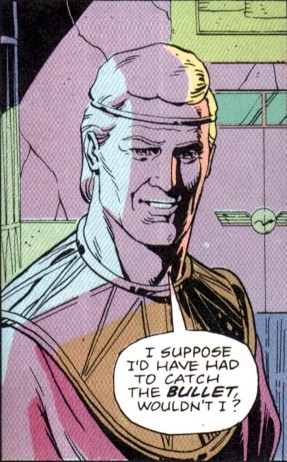
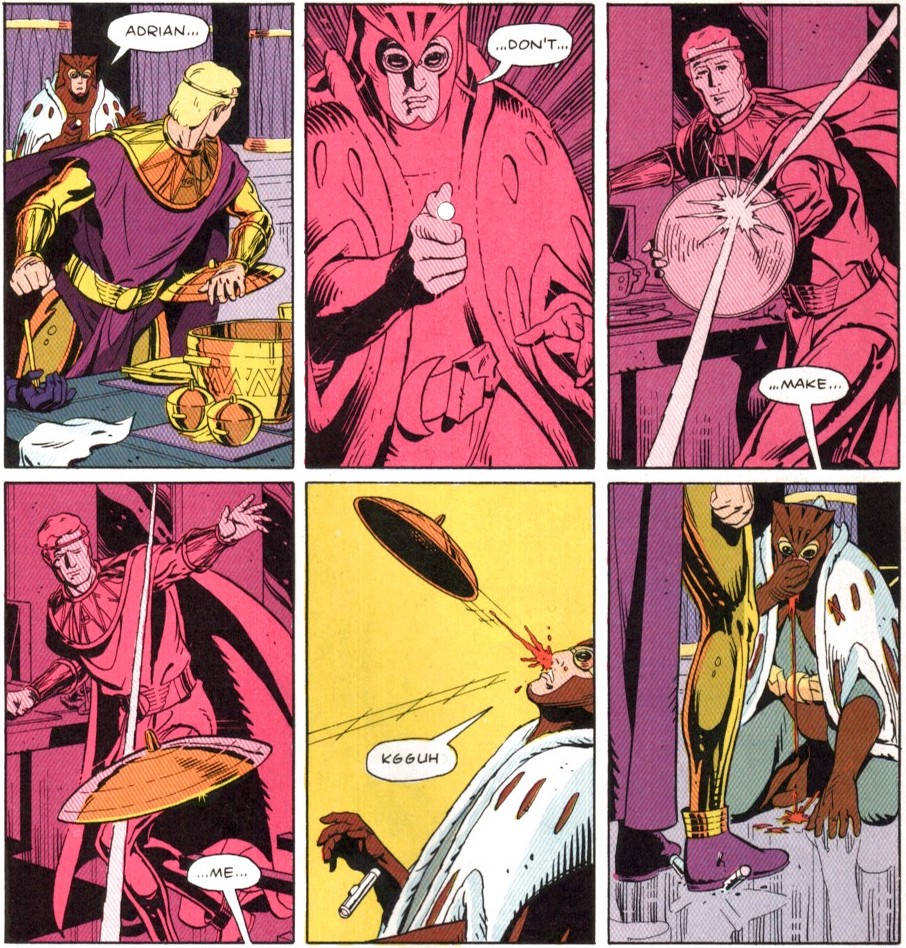
Indeed, there really aren’t any of those in Watchmen. The rape sequence in “Absent Friends,” the alley fight in “The Judge of All the Earth,” Rorschach’s escape in “Fearful Symmetry,” and the failed attempt to stop Ozymandias in “Look Upon My Works Ye Mighty” are the only multipanel fight scenes in the book. This last one is perhaps most instructive in how Moore and Gibbons fundamentally reconceptualize how superhero action works. The scene is built out of simple, small, and decisive movements. Rorschach sneaking up on Ozymandias is given five panels in which the process is show meticulously—Rorschach begins to approach, Ozymandias sees his reflection, there’s a POV shot of Rorschach’s hands approaching, a profile shot of Ozymandias eating, Rorschach’s hands about to reach his neck, and then, in two panels, Ozymandias pins Rorschach’s arm to the table with his fork and punches him. As with Rorschach throwing the cooking oil at the inmate in “The Abyss Gazes Also,” these actions are portrayed tightly, in the middle of the action as opposed to the John Romita-endorsed “Marvel Way” of using the exaggerated ends of the action. The next page is similar—Night Owl makes his attack, and Ozymandias uses the table setting to deflect it, with the speed and decisiveness of Ozymandias’s actions emphasized by breaking Night Owl’s “Adrian, don’t make me…. Kgguh” dialogue up over five separate panels to emphasize how quickly Ozymandias is acting.
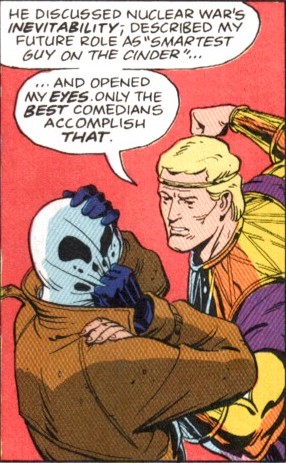
The next two pages take this even further, intercutting between a continuing fight scene and Ozymandias narrating at length his history with the Comedian, so that his further beatdown of Rorschach consists of single decisive movements intercut between flashback panels. (Notably, Moore immediately switches to the exact opposite representation of time as the previous with Ozymandias getting lengthy multi-bubble monologues in between actions—the pages are in fact outlandishly talky, with each of them blowing through the oft-cited 200 words per page rule of thumb, with the first one having a staggering average of 26 words per panel. On what is, again, nominally an action sequence. The result of this intense perversity is not simply to make Ozymandias look wildly more capable than his two opponents, but to move the focus completely away from any sense of thrillingly kinetic movement and onto the tactical precision of Ozymandias’s moves.
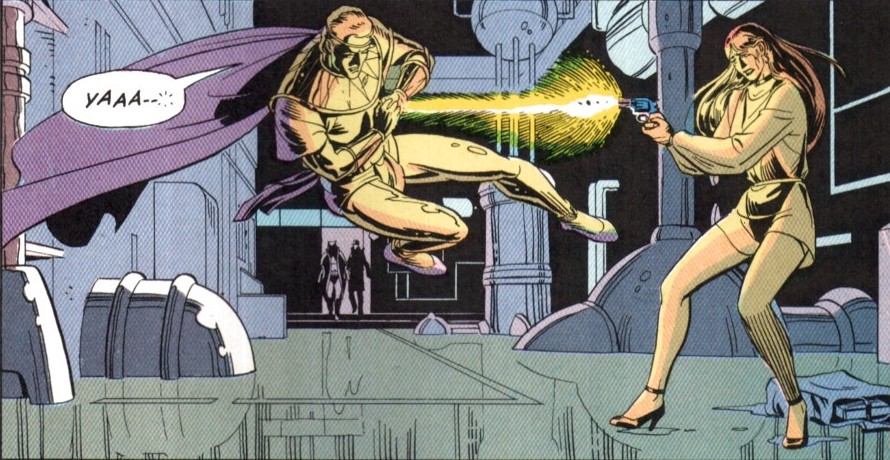
Indeed, the only use of a big, “Marvel Way” action shot comes in “A Stronger Loving World,” as Laurie attempts to shoot Veidt and he leaps into the air to catch the bullet. Gibbons first draws Ozymandias with motion blur, his arm and leg leaving a trail of images behind them, a trick borrowed from Frank Miller’s Daredevil work, and then draws him dramatically posed in mid-air at the moment of impact. But it’s notable that this one moment of extreme kineticism in the comic comes at a moment of failure—the point of the scene is that the villain is not stopped, and that the standard superhero narrative of climactic violence saving the day doesn’t work. To quote Ozymandias a few pages later, “my new world demands less obvious heroism, making your schoolboy heroics redundant.”
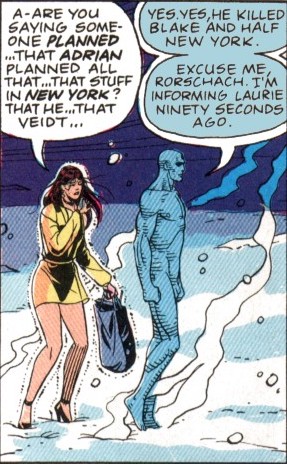
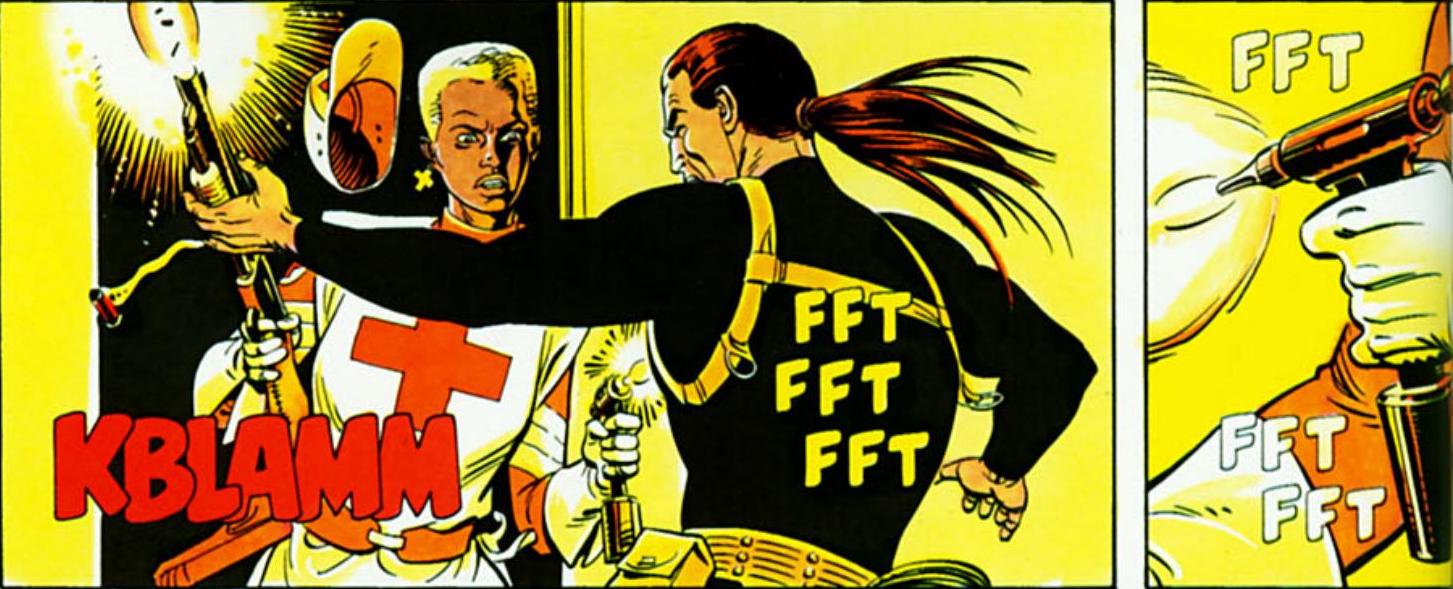
It is worth stressing that all of this constitutes an extremely savvy use of Dave Gibbons’s talents on Alan Moore’s part. Gibbons is an extremely clean and tidy artist, particularly skilled at clear storytelling and expressive faces. However there’s a stiffness to his work that can be awkward in the context of superhero comics. Simply put, he’s not actually very good at John Romita-style big action poses in the first place; Moore’s rejection of them in favor of smaller, tighter movements is a case of turning his artist’s weaknesses into an expressive constraint in the same way as the nine-panel grid. And it’s notable that while Moore would go on to invent new and equally dazzling techniques to flatter future artists, most of Gibbons’ later collaborators would struggle to make anywhere near as good use of him. His most immediately prominent post-Watchmen project, Give Me Liberty, offered a mouthwatering team-up with Frank Miller. But Miller’s propensity for grotesque settings and ostentatious action completely failed to play to any of Gibbons’s strengths. Later in his career he had better results working with Mark Millar on The Secret Service, where at least Millar tailored his particular style of excessive violence to Gibbons’s talents, but one still is left with the impression that Gibbons was chosen because the cleanliness of his style would make pitching the book to film executives easier, as opposed to because the comic was consciously being tailored to his skills. None of this is to say that Gibbons is not a great artist—it would be absurd to claim that about the artist of Watchmen. Even the greats have their weaknesses—as the Neal Adams adage goes, style is just the things you keep doing wrong. But the scale of Gibbons’s greatness is evident to the world because Moore crafted a work in which all of his weaknesses were minimized while all of his strengths were maximally played to.
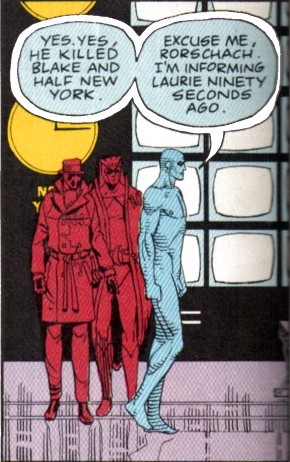
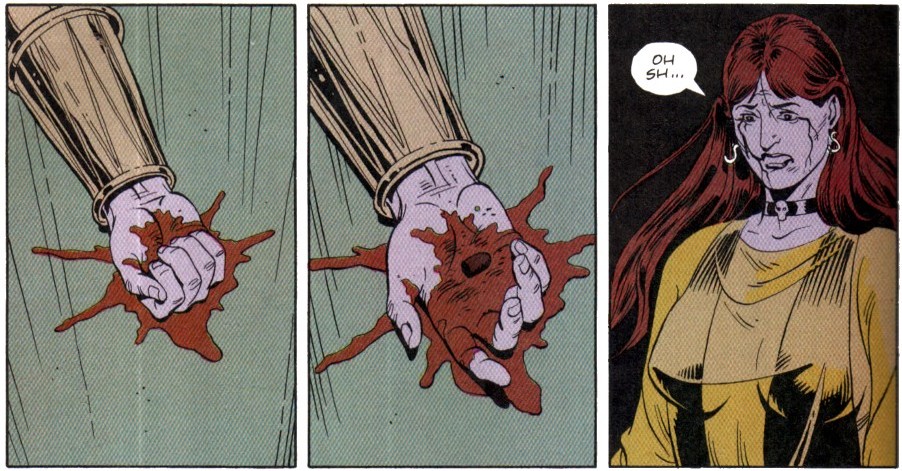
In that regard, more important than what is absent from Watchmen’s storytelling is what is present. Continuing with the bullet catch sequence, consider the way in which the reveal that Ozymandias caught the bullet is structured. First, there is a panel of Laurie from behind, holding the still smoking gun, standing over Ozymandias’s prone body, a visible pool of blood around his outstretched hand. Then a smaller panel, still over Laurie’s shoulder and thus allying the reader with her point of view, looking down at Oymandias, the bloody hand more pronounced. Then, after a page turn, a panel of just the hand, then one of the hand opening to reveal the bullet, then a reaction panel of Laurie saying “Oh sh…” before Ozymandias rouses to kick her in the stomach. It’s slow and methodical, carefully including each beat and incremental step of the process. The result is that the reader, if they are paying any attention, knows full well that Ozymandias has caught the bullet (which is foreshadowed six pages earlier with a four panel sequence where Night Owl asks what would have happened if the assassin in “Fearful Symmetry” had shot him instead of his secretary and Ozymandias says “I suppose I’d have had to catch the bullet, wouldn’t I?” and then smiles smugly when Night Owl expresses incredulity) well before the actual panel where he opens his hand to reveal it.
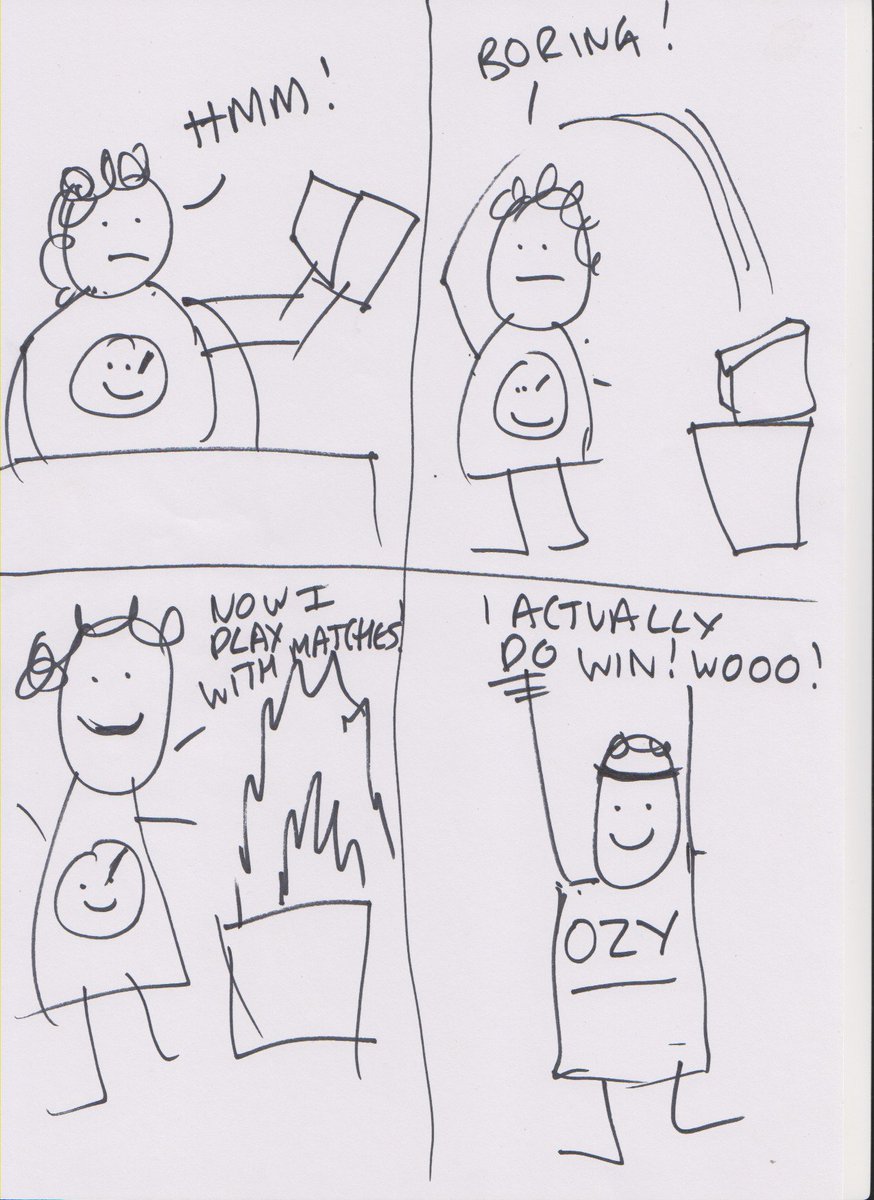
Similar examples are so abundant that one could add an entire volume to the chronicling of the War simply to enumerate them all. It is a methodology used in action sequences, dramatic reveals, and even in small scale scenes, such as the more than a full page of silent panels of Doctor Manhattan walking across and through Karnak to reach Ozymandias after killing Rorschach, or the full page spent on Seymour walking across the city. Over and over again, the comic uses a meticulous procession through small actions. To pick perhaps the biggest example, the climax happens, essentially unnoticed, in a two page sequence in which Ozymandias pushes a button, so that the book’s biggest moment is not an event happening, but the reveal that an event has already happened. This is vital to the final page of the comic, with Seymour’s hand hovering over the crank file, about to pick up Rorschach’s journal, which would lead to the exposure of Ozymandias’s scheme. It is normal to describe the ending as ambiguous, but doing so, as both Kieron Gillen and Grant Morrison note when talking about the comic, ignores everything that the reader has been taught about how to read the comic. Within the logic of the comic’s small precise movements, the four panel sequence at the end in which Seymour resolves to run something from the crank file, then turns toward the pile and reaches towards Rorschach’s Journal can only resolve one way.
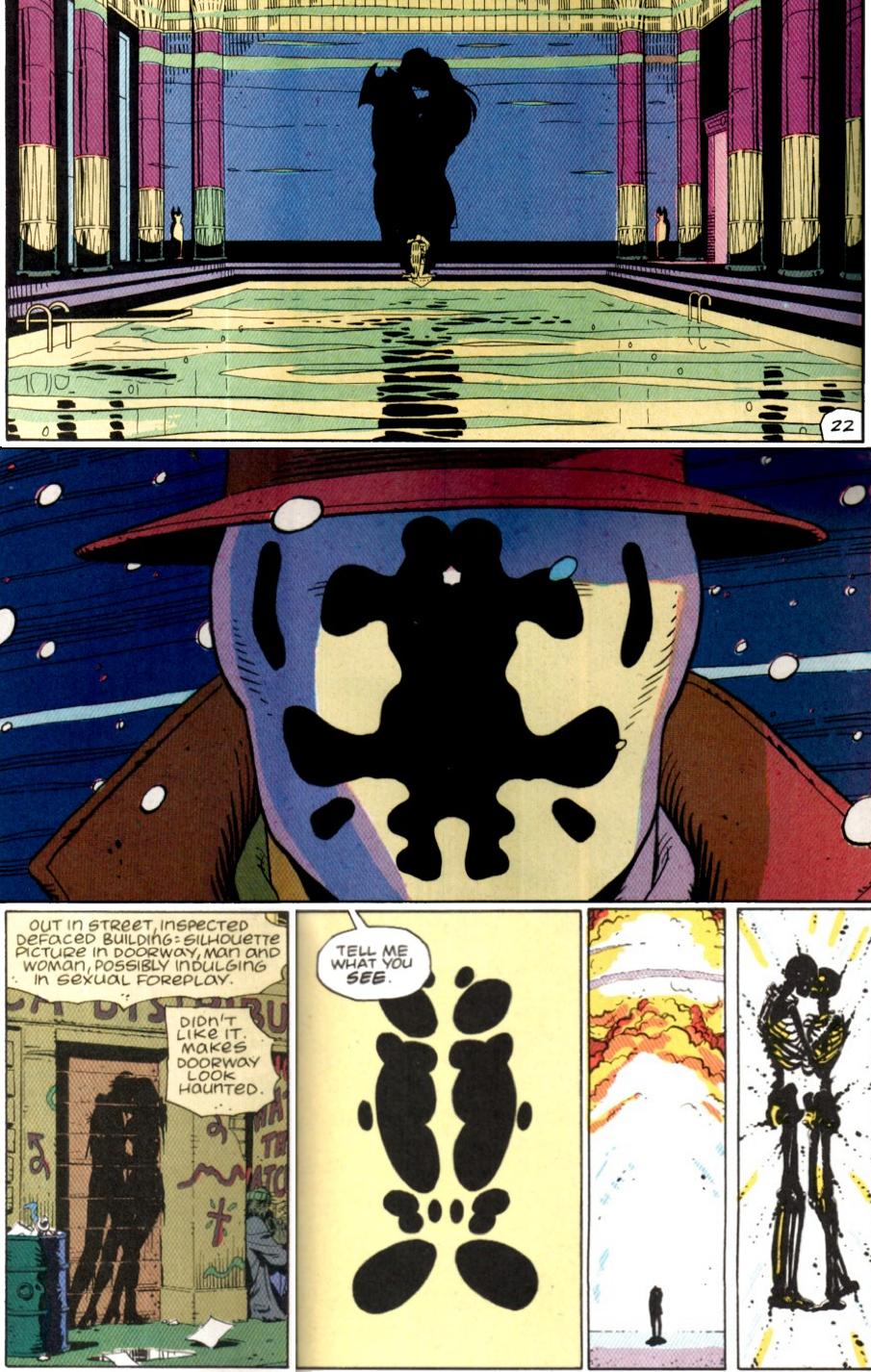
Moore and Gibbons’s use of this technique is essential to contextualizing the other techniques of Watchmen, particularly its image-based transitions and heavy use of recurring symbolism and overlapping narratives. For instance, in “A Stronger Loving World” Moore and Gibbons employ an image-based transition, moving from a silhouette of Dan and Laurie embracing to a close-up of Rorschach’s mask, the shape of which echoes their embrace. This transition is doing a lot of things—it calls back to issue #6, where a transition from a Rorschach card to a flashback of Walter’s mother having sex is used to begin introducing his issues in this sphere, and to the transition away from Rorschach’s flashback, which uses a second silhouette of Walter’s mother beating him. This in turn calls back to the “Hiroshima Lovers” graffiti that Rorschach talks about in issue #5 and that Malcolm Long sees again in issue #6, which is in turn echoed by Malcolm and Gloria’s embrace elsewhere in the issue, while also calling back to the climactic image of Dan’s nightmare in issue #7. But because this is all bound up in a panel transition within the larger context of Moore and Gibbons’s use of microtransitions, all of this collapses into something that is implicitly as small as the tiny actions that make up the bulk of the panel transitions. The result of this is that all of the thematic density of Watchmen becomes immediate, tightly bound to every moment of the story.
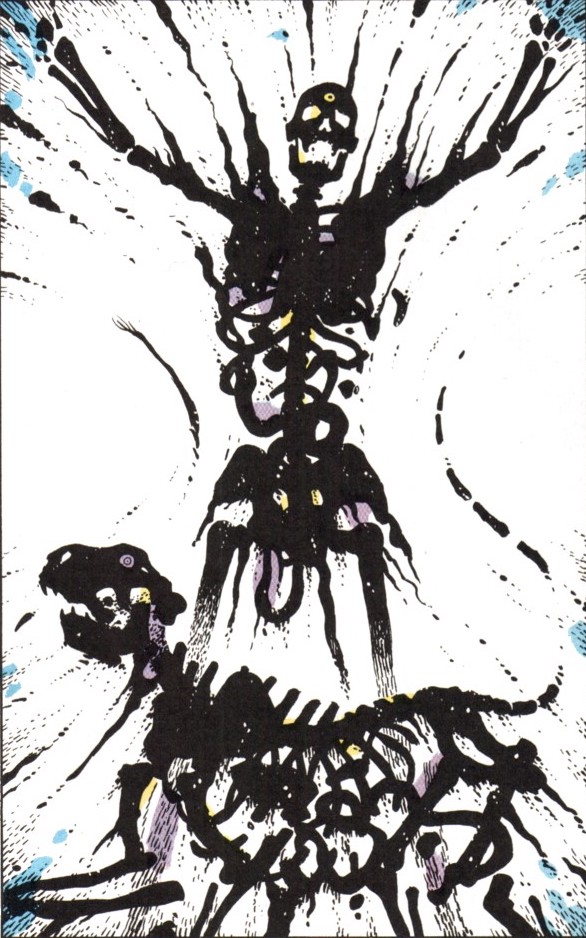 In light of this, Doctor Manhattan’s experience of the world as a massive simultaneity is less a declaration about how the universe of Watchmen works than another teaching tool in pursuit of Watchmen’s real message about how to read comics. By expressing time as something that is experienced in simultaneity, Moore makes it so that the microtransition doesn’t have to be used exclusively within the context of methodical depictions of action, but can also be used to move across time, allowing for transitions like Doctor Manhattan kissing Laurie for the first time to Janie Slater packing to leave him, while the narration adds a two further temporal microtransitions, linking the moment to his meeting Janie and his staring at the photograph of them together on Mars. The point isn’t that the world of Watchmen works according to the philosophic system Moore would eventually develop in Jerusalem (although it’s just as obvious an antecedent as his old “Eureka!” Future Shock)—that’s ultimately refuted by “A Stronger Loving World,” where Doctor Manhattan no longer can directly experience the future, giving the distinct implication that free will still exists within Watchmen. It’s simply to further widen the field of what sorts of moments might be adjacent within Watchmen.
In light of this, Doctor Manhattan’s experience of the world as a massive simultaneity is less a declaration about how the universe of Watchmen works than another teaching tool in pursuit of Watchmen’s real message about how to read comics. By expressing time as something that is experienced in simultaneity, Moore makes it so that the microtransition doesn’t have to be used exclusively within the context of methodical depictions of action, but can also be used to move across time, allowing for transitions like Doctor Manhattan kissing Laurie for the first time to Janie Slater packing to leave him, while the narration adds a two further temporal microtransitions, linking the moment to his meeting Janie and his staring at the photograph of them together on Mars. The point isn’t that the world of Watchmen works according to the philosophic system Moore would eventually develop in Jerusalem (although it’s just as obvious an antecedent as his old “Eureka!” Future Shock)—that’s ultimately refuted by “A Stronger Loving World,” where Doctor Manhattan no longer can directly experience the future, giving the distinct implication that free will still exists within Watchmen. It’s simply to further widen the field of what sorts of moments might be adjacent within Watchmen.
In this reading, what is clockwork about Watchmen is not its alleged determinism, but the intricacy and detail of its construction. The tight causality of the plot and intricacy of the actions depicted become of a part with the recurrent symbolism and overlapping narratives. The result is not merely a world that is deterministic, but one that is specifically authored. In this regard, Watchmen tacitly gestures at what is otherwise a tangible bit of negative space within its symbolism. For all its riffing upon watches, clockwork, and the act of watching, at no point in the comic does Moore allude to the Watchmaker analogy of 18th century philosopher William Paley. As Paley phrased it, “In crossing a heath, suppose I pitched my foot against a stone, and were asked how the stone came to be there; I might possibly answer, that, for any thing I knew to the contrary, it had lain there for ever: nor would it perhaps be very easy to show the absurdity of this answer. But suppose I had found a watch upon the ground, and it should be inquired how the watch happened to be in that place; I should hardly think of the answer which I had before given, that, for any thing I knew, the watch might have always been there. Yet why should not this answer serve for the watch as well as for the stone? why is it not as admissible in the second case, as in the first? For this reason, and for no other, viz. that, when we come to inspect the watch, we perceive (what we could not discover in the stone) that its several parts are framed and put together for a purpose.” It is inextricably the case that Watchmen is purposeful. Even when that purpose is elusive, made hard to discern under the sheer weight of overlapping symbolism and complexity, its intricacy screams out its sense of being designed. This is what Morrison complains about when he talks about the oppresive omnipresence of Moore within the text, indeed directly alluding to Paley’s argument when he says that “everywhere you looked, the Watchmaker was on hand to present his glittering structure for our approval and awe,” using “Watchmaker” as a metonym for God.
 Where Morrison loses the plot slightly is in his implication that Moore’s omnipresence within the text is wholly or even primarily motivated by showing off. This is not, obviously, to dispute Morrison’s suggestion that Moore is a showoff; he undoubtedly is. But the intense feeling of authoredness in Watchmen is not simply Moore trumpeting his genius to the world. The clue to Morrison’s evident blindspot comes in his conclusion to this section, in which he sniffs that “It was as if God had little more than contempt for his creations and gave them no opportunity to transcend the limits he’d set for them.” Although entirely consistent with Morrison’s other views on fictional characters, which really do have a measure of moral standing and dignity to him, this badly misses the point of Moore, whose view of fictional characters is ultimately disinterested in their sentience or autonomy.
Where Morrison loses the plot slightly is in his implication that Moore’s omnipresence within the text is wholly or even primarily motivated by showing off. This is not, obviously, to dispute Morrison’s suggestion that Moore is a showoff; he undoubtedly is. But the intense feeling of authoredness in Watchmen is not simply Moore trumpeting his genius to the world. The clue to Morrison’s evident blindspot comes in his conclusion to this section, in which he sniffs that “It was as if God had little more than contempt for his creations and gave them no opportunity to transcend the limits he’d set for them.” Although entirely consistent with Morrison’s other views on fictional characters, which really do have a measure of moral standing and dignity to him, this badly misses the point of Moore, whose view of fictional characters is ultimately disinterested in their sentience or autonomy.
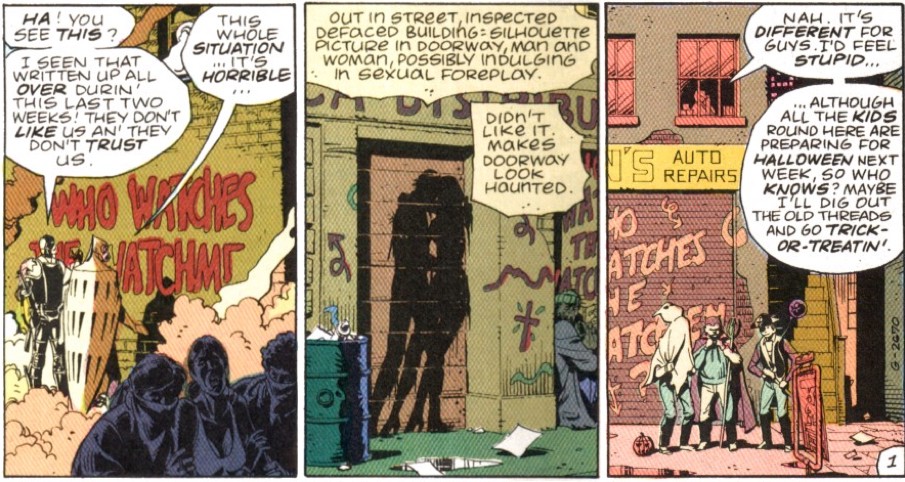
What Moore is actually doing is revealed in his title, and the Juvenal quote from which it originates. The question, rendered in English “who watches the Watchmen,” is offered frequently within the comic, appearing as graffiti throughout. In its usual context the quote is an interrogation of power—a demand that the systems of accountability within the world themselves be accountable to something. This certainly is a theme within Watchmen itself—most obviously around the Keane Act that banned masked superheroes, which is where the graffiti is most visibly discussed. But while present, this theme is in no way prominent enough to justify making it the title. The bigger clue coes in the fact that the graffiti is never actually shown in full—it is always cut off or interrupted somehow. In other words, the phrase “who watches the Watchmen” exists not within the comic, but in the reader’s implicit completion of the action. Which is, of course, the same basic process by which the reader sutures together all the tiny gaps between panels, making action out of static images just as they complete the phrase out of any given piece of partial graffiti.
In which case the question has an obvious answer. Who watches the Watchmen? The reader. This is, indeed, at the heart of the comic’s status as an argument about how comics should be. From this, quite a lot follows. For one thing, the tone of Moore’s conspicuous authorship shifts noticeably; it stops being about valorizing Moore, and starts being about the fact of Moore being seen. Moore’s presence ensures that Watchmen is read as something that is constructed and built. The point is not, as Morrison, blinded by his own desires, imagines—to forever ensure that “from that moment on and no matter what else he did, he would be Alan (Watchmen) Moore,” but rather to ensure that the comic was always “Alan Moore and Dave Gibbons’ Watchmen.” This, in turn, makes the common description of it as a “realist” superhero comic fundamentally in error. To read Watchmen in terms of reality is to fundamentally miss the point, which is precisely that it is constructed—that it is governed not by the chaotic happenstance of the real world but by a carefully judged and considered creative hand.
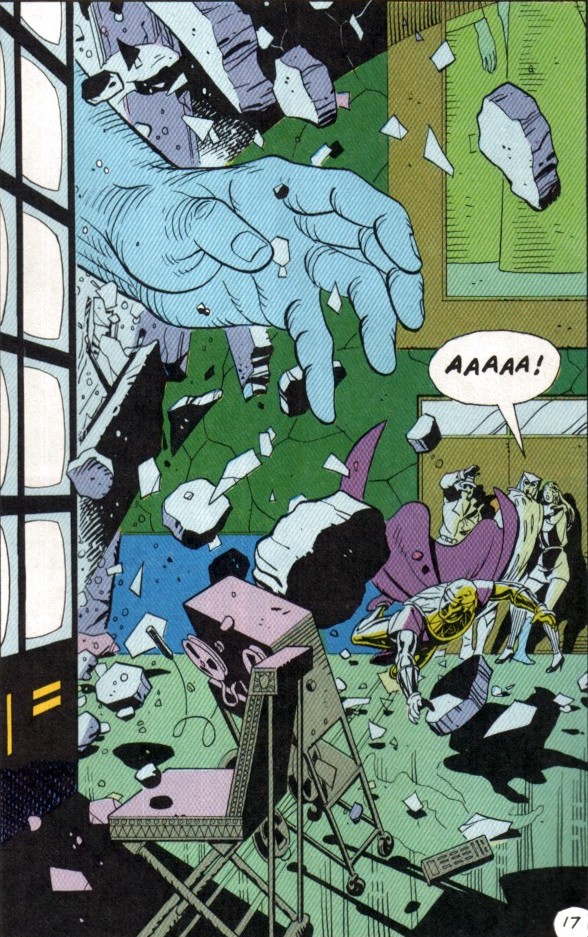 In light of this reading, two figures emerge within the comic as particularly significant because they in some way engage in the act of reading the text from the inside. The first of these is of course Doctor Manhattan, whose simultaneous experience of all of time means that he can see all of the moments within the comic, a fact that in “Watchmaker” is made relatively explicit by reusing key images so as to literalize his act of experiencing as returning to previous panels of the comic. But Doctor Manhattan, while a capable reader, he is repeatedly shown to be extremely limited in his interpretive abilities; this is virtually the point of “The Darkness of Mere Being,” where he needs Laurie to patiently explain to him that people matter. He sees, but he does not understand.
In light of this reading, two figures emerge within the comic as particularly significant because they in some way engage in the act of reading the text from the inside. The first of these is of course Doctor Manhattan, whose simultaneous experience of all of time means that he can see all of the moments within the comic, a fact that in “Watchmaker” is made relatively explicit by reusing key images so as to literalize his act of experiencing as returning to previous panels of the comic. But Doctor Manhattan, while a capable reader, he is repeatedly shown to be extremely limited in his interpretive abilities; this is virtually the point of “The Darkness of Mere Being,” where he needs Laurie to patiently explain to him that people matter. He sees, but he does not understand.
In contrast to him stands Ozymandias, who explicitly sits and watches the world, staring at his wall of screens that is visually represented as the same nine panel grid upon which the comic is written. Ozymandias is alone in being able to see the symbolic dimensions of the comic—most tellingly, he makes mention of a recurring dream ”about swimming towards a hideous…” that is clearly a reference to the Black Freighter comic. But even beyond that, his use of multiscreen viewing to see hidden patterns of the world represented in its symbolism, an approach explicitly credited to Burroughs, demonstrates that he understands how to read Watchmen. Fittingly, then, it is him who gets the title drop in “Look Upon My Works, Ye Mighty,” quoting Kennedy’s undelivered speech in Dallas about America being “the watchmen on the walls of world freedom.”
This further clarifies the final scene, in which the entire point is that the reader overtakes Ozymandias, seeing that his scheme is doomed to failure when he cannot. Indeed, the book is more broadly structured to move the reader through various frames of reading, starting with Doctor Manhattan’s vast but fundamentally uncomprehending reading, progressing to Ozymandias’s more intricate and symbolic mode, and finally transcending it precisely at the moment where the reader emerges from the work, newly empowered to read or even create comics with the ideas they have learned.
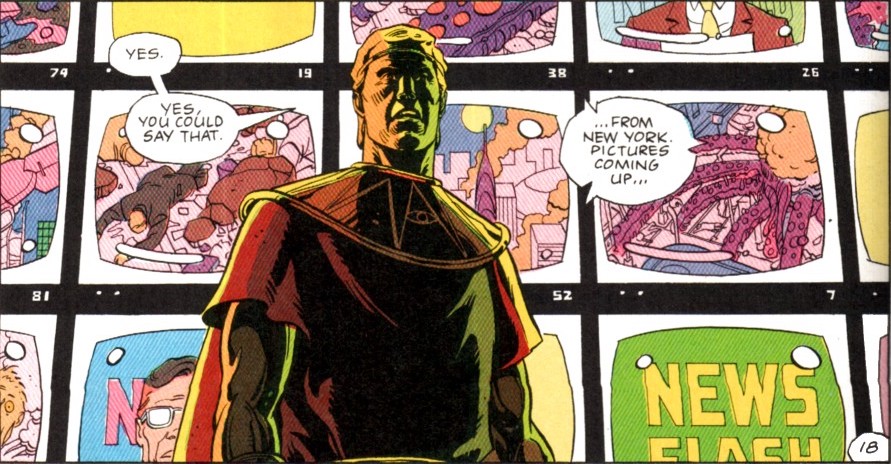 For all that he flubs some of the details, Morrison broadly understood this. Where others were seduced by Watchmen’s edgy darkness, Morrison saw more than that, recognizing the dense structural elements at play. Writing about the overlapping dialogue of Watchmen #3, where Moore found his footing on the series and began to understand what the comic could do, he notes, “the parallel narrative threads of Manhattan and Laurie reflected and commented upon each other in a kind of remote quantum entangled conversation that perfectly suited Manhattan’s nature and dramatized the breakdown of a relationship. This relentless self-awareness gave Watchmen a dense and tangible clarity. Everything connected in a dazzling, elaborate hall of narrative mirrors.” He understood perfectly well what Watchmen did, what argument it was making about the structural possibilities of comics, and what its vision of the future was. Indeed, when Morrison took most deliberate aim at Watchmen, pastiching its style for Multiversity: Pax Americana, he hit this target with a directness few had managed in the nearly thirty years since Watchmen. Morrison not only understood what Watchmen did; he was perfectly capable of imitating it.
For all that he flubs some of the details, Morrison broadly understood this. Where others were seduced by Watchmen’s edgy darkness, Morrison saw more than that, recognizing the dense structural elements at play. Writing about the overlapping dialogue of Watchmen #3, where Moore found his footing on the series and began to understand what the comic could do, he notes, “the parallel narrative threads of Manhattan and Laurie reflected and commented upon each other in a kind of remote quantum entangled conversation that perfectly suited Manhattan’s nature and dramatized the breakdown of a relationship. This relentless self-awareness gave Watchmen a dense and tangible clarity. Everything connected in a dazzling, elaborate hall of narrative mirrors.” He understood perfectly well what Watchmen did, what argument it was making about the structural possibilities of comics, and what its vision of the future was. Indeed, when Morrison took most deliberate aim at Watchmen, pastiching its style for Multiversity: Pax Americana, he hit this target with a directness few had managed in the nearly thirty years since Watchmen. Morrison not only understood what Watchmen did; he was perfectly capable of imitating it.
He just didn’t care. He was instead resolutely unimpressed by Watchmen. As he put it, “For all its pretensions to realism, Watchmen laid bare its own synthetic nature in every cunningly orchestrated line, lacking in any of the chaos, dirt, and non sequitur arbitrariness of real life. This overwhelming artificial quality of the narrative, which I found almost revolting at age twenty-five, is what fascinates me most about it now, oddly enough. I preferred the sprawl and turbulence of Marvelman, which felt more like the real, messy world than the stifling, self-regarding, perfect yet mean-spirited microcosmos of Watchmen, but I was alone in my negative judgment.” And he was similarly unmoved by its tone, snarking in interviews as early as 1989 about how “There have been so many smug pronouncements about Watchmen being the tombstone on the grave of the superhero concept but I think it’s merely the farewell to one very narrow interpretation of the superhero – the ‘realistic’ superhero. To me it’s the final proof that that type of approach is unable to sustain its own logic.” In Watchmen, Morrison saw a technically impressive dead end.
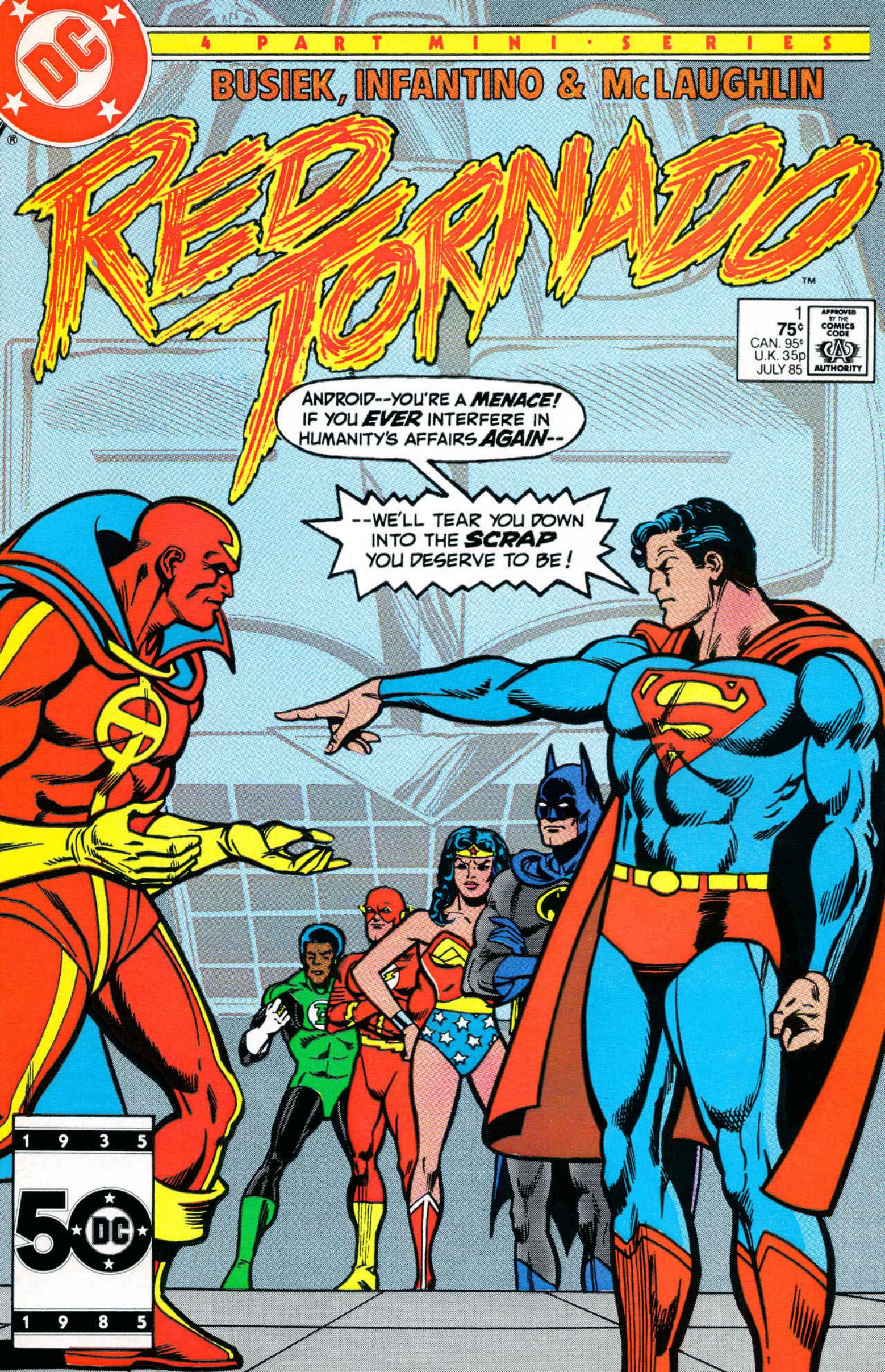
And so Morrison took his own lessons from Watchmen. Yes, Watchmen, and Moore’s career at large demonstrated that there were appetites within comics fandom not served by the bulk of superhero fare coming out of DC. But, after all, that stuff was still selling too, and selling quite well. In March of 1985, in the heart of Moore’s Swamp Thing run, the title shifted 11,350 copies from Capital Distributors, good for 38th place. This is impressive enough—that month’s issue of Crisis on Infinite Earths moved only about four times as many copies. But it was still decisively outsolde not only by smash hits like the Wolfman/Pérez New Teen Titans run but by titles like Hawkman and the debut issue of a four-part Red Tornado miniseries. Detailed sales charts for Watchmen are not widely available, but the book debuted as the 5th most popular comic, then dipped down to about 15th, and was consistently outsold by John Byrne’s Superman comics. And when Hellblazer debuted in September of 1987, it was all the way down in 43rd, outsold by Superman, Batman, Wonder Woman, and Flash, along with Doom Patrol and Suicide Squad. And DC was heavily outsold by Marvel, who had not a whit of interest in the intellectual posturing of the British scene, and were selling more copies of decade-old X-Men reprints than all but the top DC titles..
So Morrison split the difference, just as he had with Zenith. In effect, he reasoned that the appeal of Watchmen, and of Moore’s work in general, was that it made the reader feel intelligent. But this did not require the baroque structural gambits of Watchmen, especially for a comics reader who was broadly satisfied with the bulk of DC or Marvel’s output. More to the point, there was a cynical calculation to be made that for a good number of Watchmen’s readers the appeal was not in plumbing the vast depths of symbolism but in the fact that the book made them feel smart. This is not to say that American comics readers were universally an unsophisticated lot who could be swayed by anything, although one could point to plenty of developments in the industry in the decade to follow Watchmen to support that case; simply that there was a very large middle ground between the general caliber of American superhero comics and Watchmen that could be occupied. It was more than possible to craft colorful and action-packed fun that also made readers feel clever for appreciating it.
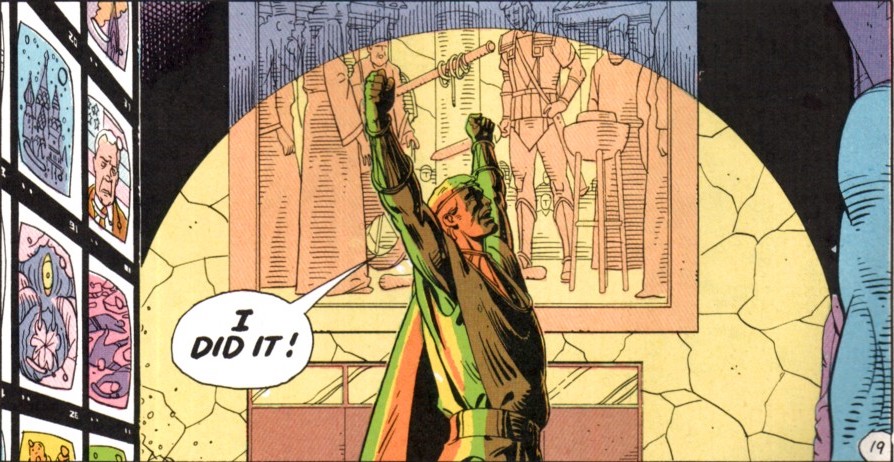 In realizing this, Morrison largely anticipated the direction of American superhero comics over the next thirty years—a significant upward shift to the basic competence of comics that was not accompanied by any real increase in ambition, complexity, or difficulty. Comics got smarter and evolved, but in a fundamentally conservative way, with far more limitations kept resolutely in place than pushed at. And as the first man out of the gate with the realization that this approach was the future of comics, Morrison was better positioned than anybody to capitalize on the onrushing future. If the battle that is Watchmen had a winner, it was Grant Morrison.
In realizing this, Morrison largely anticipated the direction of American superhero comics over the next thirty years—a significant upward shift to the basic competence of comics that was not accompanied by any real increase in ambition, complexity, or difficulty. Comics got smarter and evolved, but in a fundamentally conservative way, with far more limitations kept resolutely in place than pushed at. And as the first man out of the gate with the realization that this approach was the future of comics, Morrison was better positioned than anybody to capitalize on the onrushing future. If the battle that is Watchmen had a winner, it was Grant Morrison.
But if Morrison won, it was in no small part because of how abjectly everybody else failed. Morrison, at least, saw what Watchmen was doing and crafted an opposing vision of his own. He did not rise to Moore’s challenge in the way Moore wished, but he rose to it, challenging it with the glorious hubris of declaring himself an equal and opposite force. One can debate whether he is, and indeed that is a major question of the War, but one cannot pretend that Morrison in any way ducked the challenge that Moore laid forth. This is considerably more than can be said for almost anybody else.
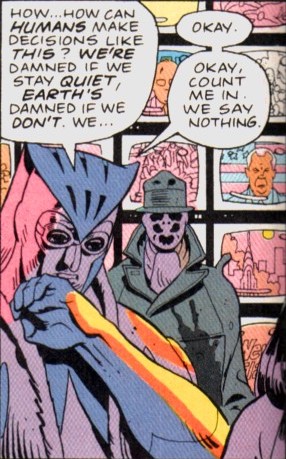 It is not simply that DC betrayed Moore’s trust on the matter of Watchmen’s creator-owned status, and would over time turn away from creator-owned projects in their entirety in favor of controlling the all-important film rights to any comic they produced. Nevertheless, it is worth being clear: DC stole the characters that Moore and Gibbons created for Watchmen from them. There is ample evidence that Moore was told at the time that Watchmen was a creator-owned series. The precise details of his contract are opaque—it has never been released, and the most common assumption, that the rights would revert to Moore if the title ever went out of print, is based on relatively threadbare evidence. But there is clear evidence that Moore believed at the time that Watchmen was a creator-owned project. As he said at the 1985 San Diego Comicon, “we got the contract, and it was work for hire. We said we’d rather not work for hire. They said, ‘Sure.’” He goes on to explain a variation of the “DC owns it for the time they’re publishing it” account, but the underlying point remains: the contract was presented to Moore as a creator-owned contract. And this is impossible to square away with the current position of AT&T, DC’s current corporate owner, that they completely own Watchmen and are free to exploit it in any medium including the production of sequels.
It is not simply that DC betrayed Moore’s trust on the matter of Watchmen’s creator-owned status, and would over time turn away from creator-owned projects in their entirety in favor of controlling the all-important film rights to any comic they produced. Nevertheless, it is worth being clear: DC stole the characters that Moore and Gibbons created for Watchmen from them. There is ample evidence that Moore was told at the time that Watchmen was a creator-owned series. The precise details of his contract are opaque—it has never been released, and the most common assumption, that the rights would revert to Moore if the title ever went out of print, is based on relatively threadbare evidence. But there is clear evidence that Moore believed at the time that Watchmen was a creator-owned project. As he said at the 1985 San Diego Comicon, “we got the contract, and it was work for hire. We said we’d rather not work for hire. They said, ‘Sure.’” He goes on to explain a variation of the “DC owns it for the time they’re publishing it” account, but the underlying point remains: the contract was presented to Moore as a creator-owned contract. And this is impossible to square away with the current position of AT&T, DC’s current corporate owner, that they completely own Watchmen and are free to exploit it in any medium including the production of sequels.
One can validly make the point that Moore should have been more attentive to the precise terms of his contract; his suggestion that he never read it or had a lawyer look at it is, if it is true, a moment of shocking negligence on his part. Nevertheless, to suggest that his negligence justifies DC’s blatant deception crosses into victim blaming. It is absurd in the same way that it’s OK to rob someone’s house if they forget to lock their front door would be. And anyway, what credibility does DC have on this? They are, after all, the company that actively punished and blackballed Jerry Siegel and Joe Shuster for the temerity of thinking that possibly they deserved more than $130 for creating Superman. They’re the company that denied Bill Finger any of the credit or money for co-creating Batman until the day he died. Their legacy of ripping off creators is literally as long as their legacy as a publisher. That they do this within the confines of “the law” is mostly an illustration of the ways in which “the law” exists primarily to protect the interests of multibillion dollar corporations. It changes nothing about the fact that DC told Alan Moore that Watchmen would be a creator-owned project, then contrived to seize full ownership of it once they realized how much money it might be worth.
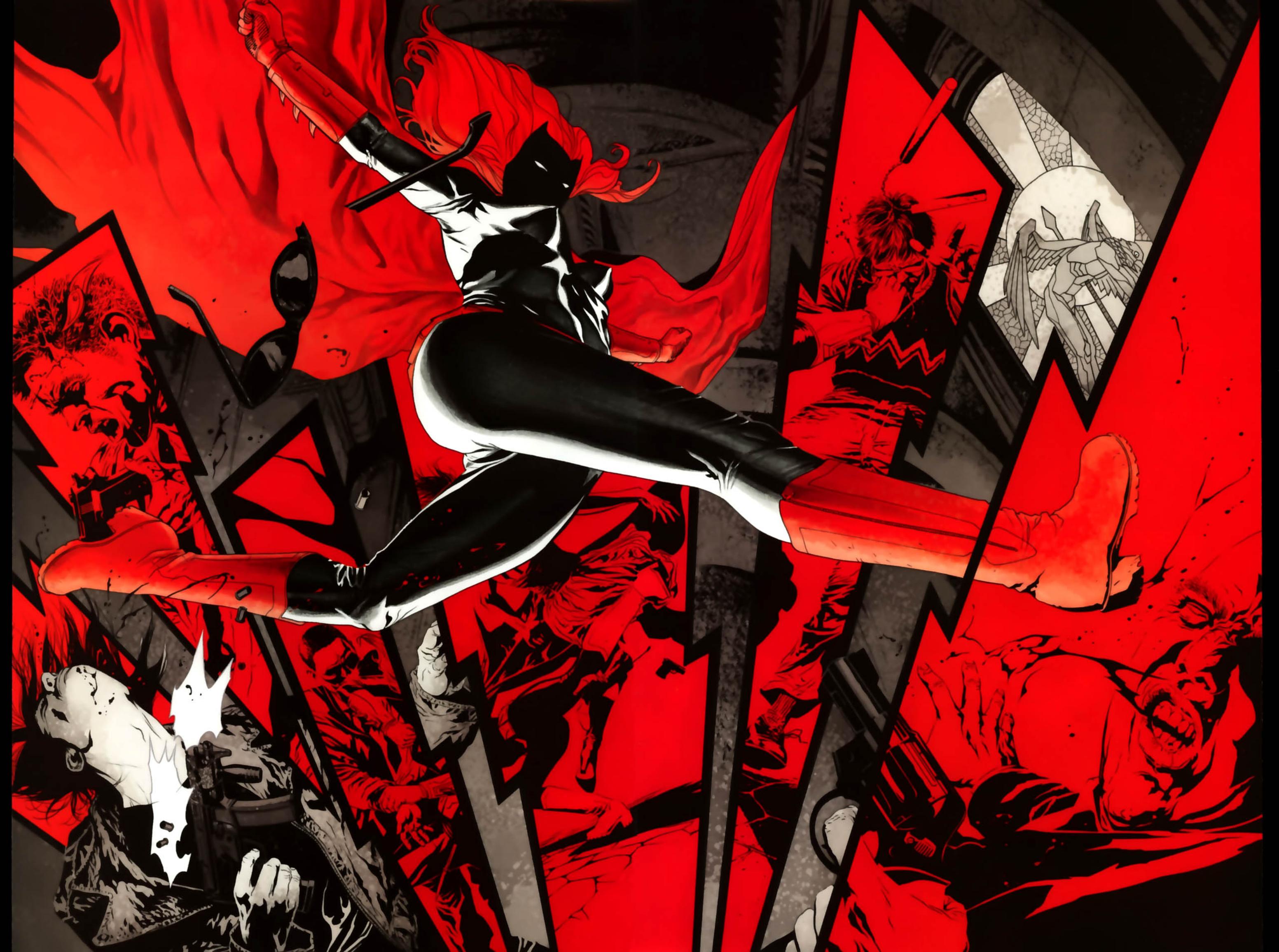
But having wrested control of Watchmen away from its creators, DC had little to no interest in continuing the formalist ambition of Watchmen. Simply put, DC never went anywhere near the formalist scope of Watchmen. More broadly, DC did not commence selling comics on the basis of their artistic depth or integrity. That’s not to say that DC would not publish further artistically worthwhile comics after Watchmen, but the idea of technical envelope-pushing was not the core of how they were marketed. And on the occasions when they accidentally found themselves with creators of comparable ambition to Moore, they often interfered and forced them from their books, as with J.H. Williams III on Batwoman.
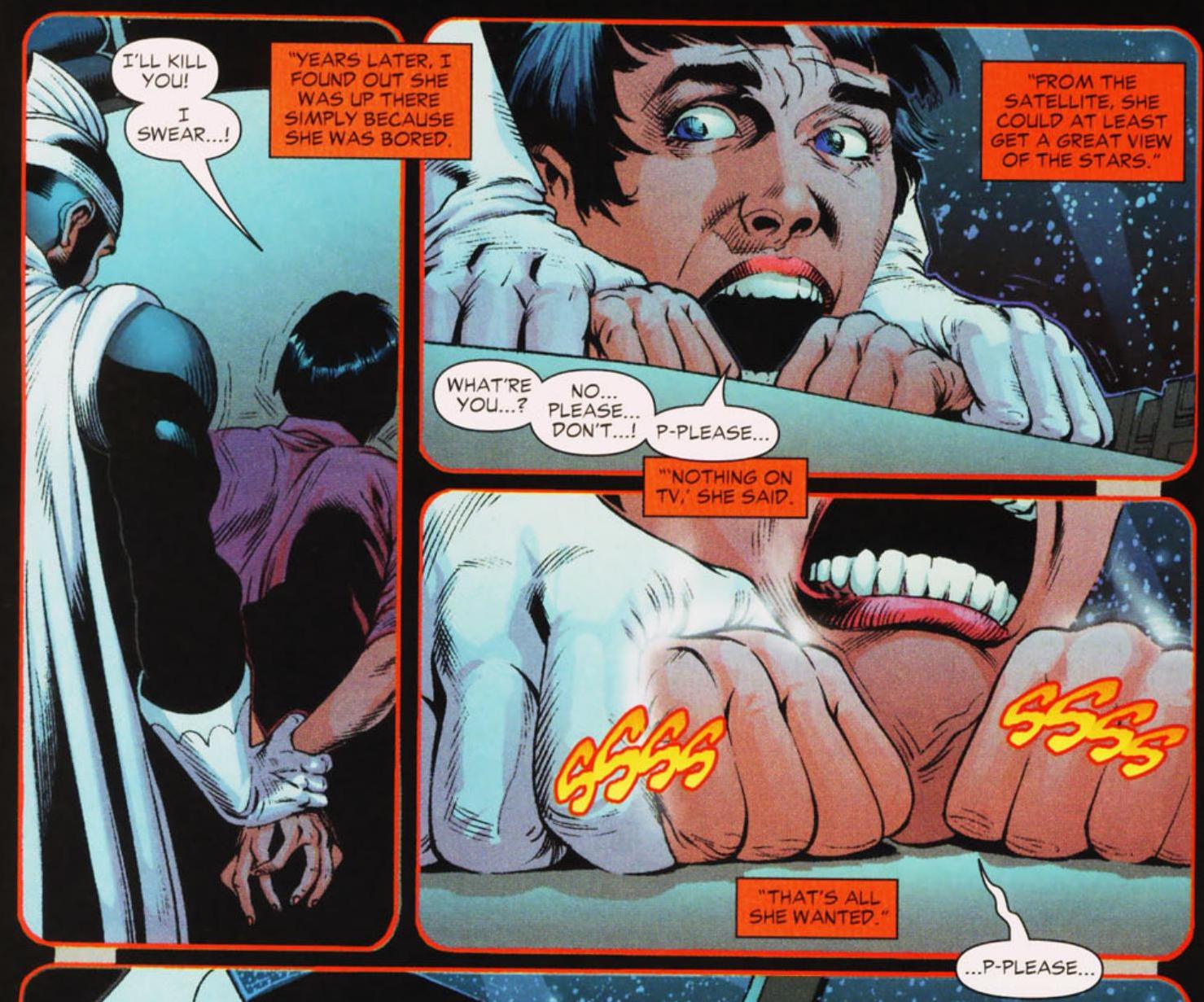
Inasmuch as DC did learn from Watchmen, what they learned was simply the appeal of its form of dark pseudo-realism. The evidence of this lesson abounds—consider their description of the book on its webpage (which is illustrated with art from the Before Watchmen project as opposed to with Gibbons art), which proclaims it as “universally acclaimed for its psychological depth and realism” while mentioning nothing about its technical ambitions. (It does, however, contain the genuinely astonishing claim that “it’s slowly and inevitably becoming it’s [sic] own franchise.”) Or consider their “After Watchmen… What’s Next?” promotion on the occasion of the film release, in which DC suggested in all seriousness that readers might want to move on to Brad Meltzer’s Identity Crisis miniseries, a staggeringly cynical take on the Silver Age Justice League of America in which a bunch of rapes and mindwipes are gratuitously added to the lore. It’s not even that this isn’t true; indeed, the real problem is that it is true, and that the reason it’s true is because DC spent the years since Watchmen marketing the idea that the aesthetic lesson of Watchmen is “superhero comics are better with rape in them.”
But even more damning is what DC actually tried to follow Watchmen with. The debacle that was Before Watchmen has already been covered, but the two purported sequels to the book are no better. Consider the aforementioned inevitable resolution of the comic’s ending—that the New Frontiersman runs Rorschach’s Journal and exposes Ozymandias’s actions. And to be fair, both Doomsday Clock and the HBO miniseries recognize that this is the only possible way in which the precise mechanisms of Watchmen could tick onwards. And yet both casually shrug this off, deciding that while Seymour picks Rorschach’s Journal and the New Frontiersman does expose the scheme, nobody believes it and everything continues as Ozymandias intended. That the alternative—Ozymandias’s scheme came crashing down around him and events went in a radically different direction—is a much harder sequel to imagine than one were the status quo at the end of the comic is broadly intact is no more viewed as a reason why such a sequel might be a bad idea as the fact that the creator of the comic explicitly said of sequels, “I don’t want money, I want this not to happen.”
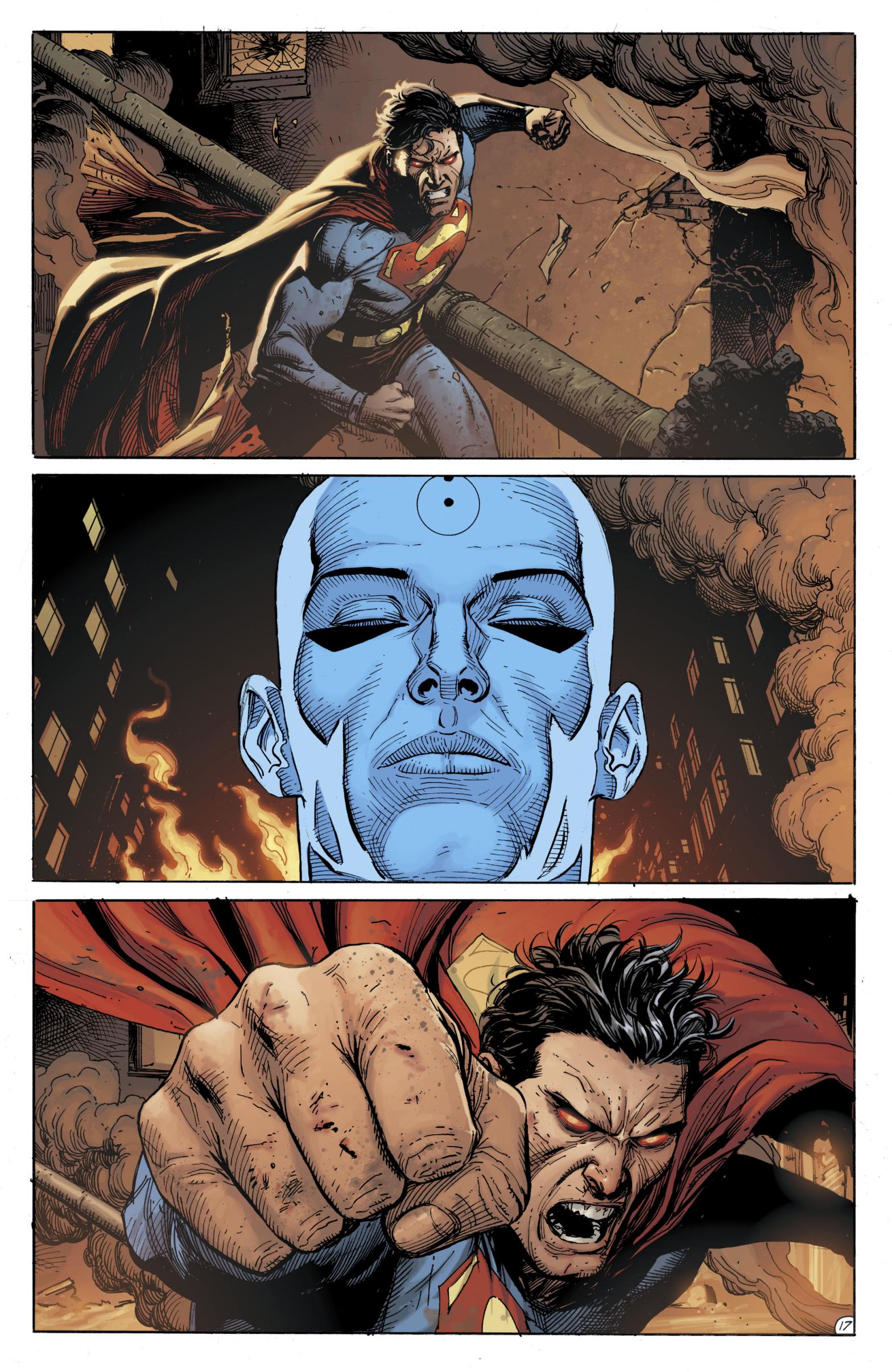
And comparing the two sequels is hardly fair, even if they did conclude just three days apart. The HBO Watchmen series, while deeply flawed and at times sloppy with its nominal source material, is at least a broadly intelligent piece of prestige television. DC’s actual Watchmen sequel, on the other hand, was literally a book about Superman and Doctor Manhattan getting into a fight. It is difficult to imagine what sort of reader would look at Watchmen and think “ah, yes, a big crossover where they fight the DC Universe heroes is the obvious follow-up to this.” It is not so much a misreading of the book as a reaction that feels entirely unrelated to the actual comic that Alan Moore wrote, engaging instead with some phantom version of it that could only ever have existed inside the heads of corporate executives whose only investment in the book was that it was a reliable revenue stream.
And yet audiences ate the projects up. The HBO series was a critical juggernaut that topped countless year’s best lists, whe first issue of Doomsday Clock moved a preposterous quarter million copies, more than double the next highest selling book. And while that had fallen by about half for the final issue, that too proved the highest-selling book of December 2019. These bastard sequels may spit in the face of every aesthetic and ethical principle that Moore expressed in the course of creating Watchmen, but the cold, honest truth is that American superhero fans by and large genuinely wanted a book about Superman punching Doctor Manhattan in the face.
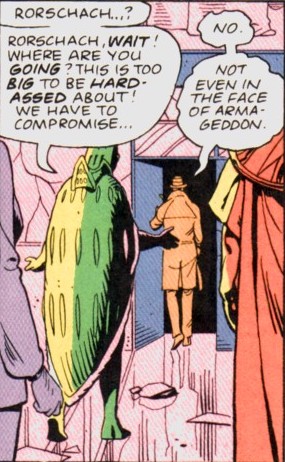 And so Moore walked away from all of them. His split from DC was already fait accompli by the time Watchmen’s reception was evident. But once comics’ collective failure to take any of the right lessons from Watchmen became clear, Moore’s alienation hardened to a cold disdain. He had showed them the future—expanded the scope of their medium in a single stroke. And they had spurned it, just as they had spurned all his advocacy for creator rights and fairer working practices. In time, this disdain would harden further to outright fury and contempt, though it would take several more heartbreaks from an industry he still instinctually loved. But the mainstream American comics industry that followed Watchmen, with its determined refusal to actually be or do better, was not one that had a place for Moore, whose vision still drove him forwards, towards new ideas and new accomplishments. Nor were fans who looked at Watchmen as little more than a cool book with lots of sex and violence, and whose reaction to it was to hope that Moore would write their favorit superhero next. And so, after four years spent turning the American comics industry on its ear, Moore took his leave of it.. He would not be slave to these corporate jackals and fannish manchildren; he would create a system of his own.
And so Moore walked away from all of them. His split from DC was already fait accompli by the time Watchmen’s reception was evident. But once comics’ collective failure to take any of the right lessons from Watchmen became clear, Moore’s alienation hardened to a cold disdain. He had showed them the future—expanded the scope of their medium in a single stroke. And they had spurned it, just as they had spurned all his advocacy for creator rights and fairer working practices. In time, this disdain would harden further to outright fury and contempt, though it would take several more heartbreaks from an industry he still instinctually loved. But the mainstream American comics industry that followed Watchmen, with its determined refusal to actually be or do better, was not one that had a place for Moore, whose vision still drove him forwards, towards new ideas and new accomplishments. Nor were fans who looked at Watchmen as little more than a cool book with lots of sex and violence, and whose reaction to it was to hope that Moore would write their favorit superhero next. And so, after four years spent turning the American comics industry on its ear, Moore took his leave of it.. He would not be slave to these corporate jackals and fannish manchildren; he would create a system of his own.
From DC’s perspective, of course, this was fine. This is the devil’s bargain at the heart of the mainstream American comics industry, ultimately. At the end of the day, DC and Marvel are not companies that exist to create new things. They do so sometimes, but this must be understood as essentially accidental byproducts of their real business. At its heart, DC is a company that exists to exploit intellectual property. Its job is to make money off the fact that it owns Batman, Superman, Wonder Woman, and the rest of its stable of characters. Making new comics is useful because it makes money off of these characters, and keeps the characters alive in the public mind. But on a fundamental level, anything would do. The Christopher Reeve Superman films, the Tim Burton Batman film, the myriad of video games to come out in the 1980s and 90s, the Superboy, Swamp Thing, and Flash TV shows, all of these were just as important as the comics, if not considerably moreso. DC did not want to be in the business of publishing the next major artistic development in the history of comics. They only vaguely wanted to be in the business of creating new intellectual property to exploit. And they certainly did not want to be in the business of publishing intellectual property they didn’t even own.
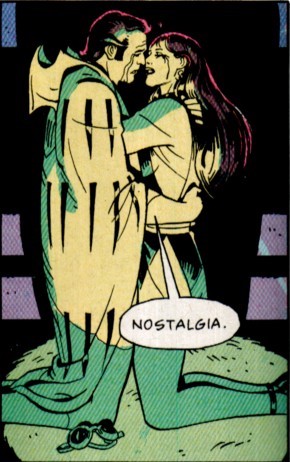 This explains why Alan Moore’s fierce stance for creator rights was not only a nonstarter, but something that had to be aggressively stamped out even at the risk of alienating one of their biggest stars. Their core business is nostalgia for decades-old work by people who were not paid a fraction of what their ideas earned. They sell the past, and now Watchmen was a part of that past, stolen free and clear, and ready for the exploitation.
This explains why Alan Moore’s fierce stance for creator rights was not only a nonstarter, but something that had to be aggressively stamped out even at the risk of alienating one of their biggest stars. Their core business is nostalgia for decades-old work by people who were not paid a fraction of what their ideas earned. They sell the past, and now Watchmen was a part of that past, stolen free and clear, and ready for the exploitation.
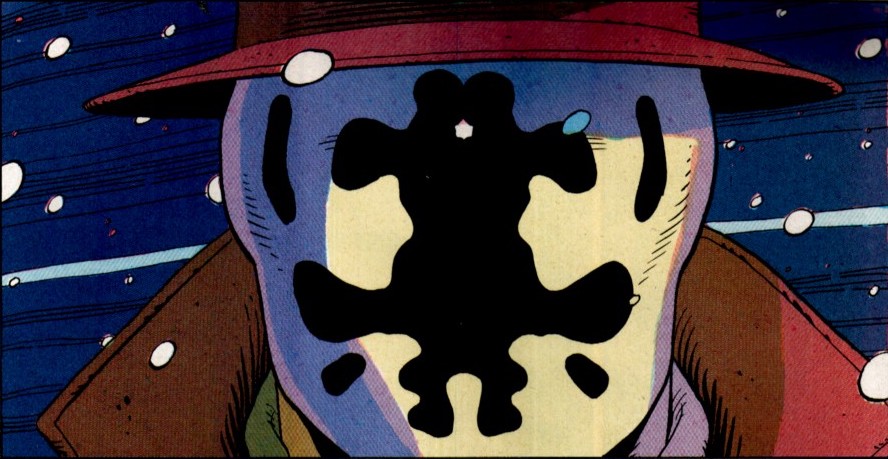 In one sense, then, it seemed as though the only real loser of Watchmen was Alan Moore. This must, of course, be said with a certain degree of hedging. Four years earlier, Moore had still been drawing The Stars My Degradation once a week for Sounds, stitching together a career out of Future Shocks, Captain Britain, and however many issues of Warrior Dez Skinn could actually publish in a year. His initial goal—make as much for his family as he had been on the dole—was met, but with what he would later describe as “the listing death-trap scaffolding of a freelance existence.” Now he was set for life—if the Watchmen royalties were not quite “never work again” money, they were certainly enough, combined with his newfound cache, to ensure that he could always find a gig if he needed one. His singular ambition when he put pen to paper and began meticulously stippling Roscoe Moscow was achieved more thoroughly and completely than he could have imagined when he decided to engage in a bit of welfare fraud. The con had worked. He’d made it. And yet.
In one sense, then, it seemed as though the only real loser of Watchmen was Alan Moore. This must, of course, be said with a certain degree of hedging. Four years earlier, Moore had still been drawing The Stars My Degradation once a week for Sounds, stitching together a career out of Future Shocks, Captain Britain, and however many issues of Warrior Dez Skinn could actually publish in a year. His initial goal—make as much for his family as he had been on the dole—was met, but with what he would later describe as “the listing death-trap scaffolding of a freelance existence.” Now he was set for life—if the Watchmen royalties were not quite “never work again” money, they were certainly enough, combined with his newfound cache, to ensure that he could always find a gig if he needed one. His singular ambition when he put pen to paper and began meticulously stippling Roscoe Moscow was achieved more thoroughly and completely than he could have imagined when he decided to engage in a bit of welfare fraud. The con had worked. He’d made it. And yet.
It was not just the sting of realizing that he’d been cheated by a bigger and crueler con than any he could have imagined. It was not that he had become seized with some new hunger—that enough wasn’t sufficient. It was not even that he was unsatisfied with how Watchmen had gone—for all that his schism with DC would eventually harden into a grief so profound he could not even stand to have the book in his house, in 1987 at least Watchmen was, to him, the triumph it so obviously had been to the entire rest of the world. It was far simpler than that.
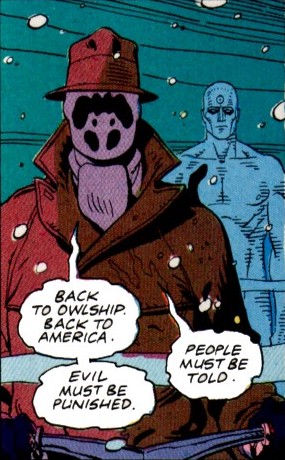 Moore is a con man, just as Morrison is a rock star. Con men do not do what they do for the money any more than DC does what it does for the artistry. The point is the thrill of getting away with it—the feeling of running on air, held aloft by nothing more or less than the sheer audacious verve of whatever you think of next. It wasn’t that he wanted more out of the deal. It wasn’t any sort of lack or insufficiency. He just didn’t want to stop. He was in far, far too deep to ever do that.
Moore is a con man, just as Morrison is a rock star. Con men do not do what they do for the money any more than DC does what it does for the artistry. The point is the thrill of getting away with it—the feeling of running on air, held aloft by nothing more or less than the sheer audacious verve of whatever you think of next. It wasn’t that he wanted more out of the deal. It wasn’t any sort of lack or insufficiency. He just didn’t want to stop. He was in far, far too deep to ever do that.
By now, however, he had been seized by a new obsession. Or, in another sense, a very old one. For Moore, after all, being a con man and being an artist are fundamentally the same thing. And another way of putting it is that the con man’s real obsession is the artistry of their craft—the drive to pull off something bigger, more outlandish, more impossible. But in the course of this he had discovered a new craft—a new artform. Perhaps there was no bigger con that he could pull off than to get rich off nothing more than ideas, nothing more than a bunch of words and pictures neatly arranged into little boxes. But in the course of that, he had laid out a manifesto for the future of a medium. And not for the last time, having laid down a chalenge, he found himself obliged to accept it. The techniques of Watchmen were not an endpoint; the genre of superheroes was not the entirety of what he cared about or had to say. He wanted to do more, and bigger. He wanted to create even more new ways of doing things.
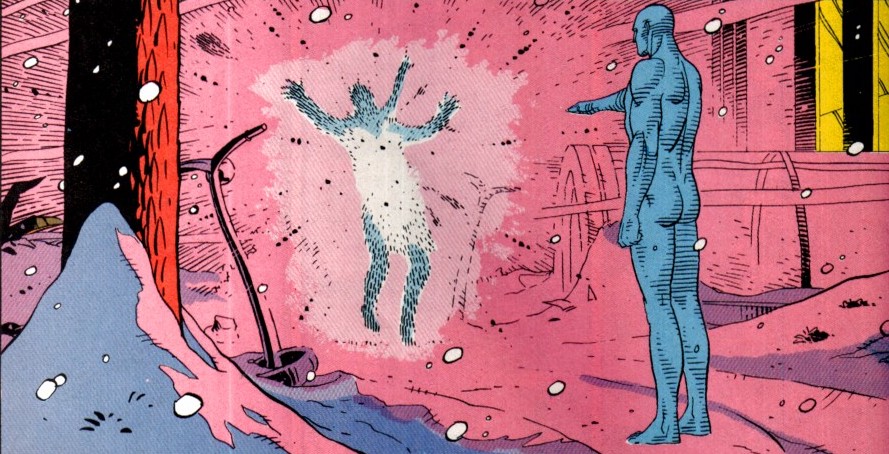 This required a shift in his obsessions. It was not that he had to stop being a con man; fundamentally, he could not do that without stopping being an artist, at least not without changing his entire worldview in a way that was fundamentally outside of his ability. But he would have to, and ultimately would become a different sort of con man, his schemes aimed at newer or bigger game. In a sense, he had realized by now what Watchmen had really accomplished—what its true purpose was. Perhaps not consciously, or in so many words, but he knew, in the end, what art was really capable of. He’d ended a war, started the War. He’d changed the world. Now he wanted to do it again, and again after that. He could not be who he was to do this, and becoming the man who could would take time. But he had seen it, and he could not look away.
This required a shift in his obsessions. It was not that he had to stop being a con man; fundamentally, he could not do that without stopping being an artist, at least not without changing his entire worldview in a way that was fundamentally outside of his ability. But he would have to, and ultimately would become a different sort of con man, his schemes aimed at newer or bigger game. In a sense, he had realized by now what Watchmen had really accomplished—what its true purpose was. Perhaps not consciously, or in so many words, but he knew, in the end, what art was really capable of. He’d ended a war, started the War. He’d changed the world. Now he wanted to do it again, and again after that. He could not be who he was to do this, and becoming the man who could would take time. But he had seen it, and he could not look away.
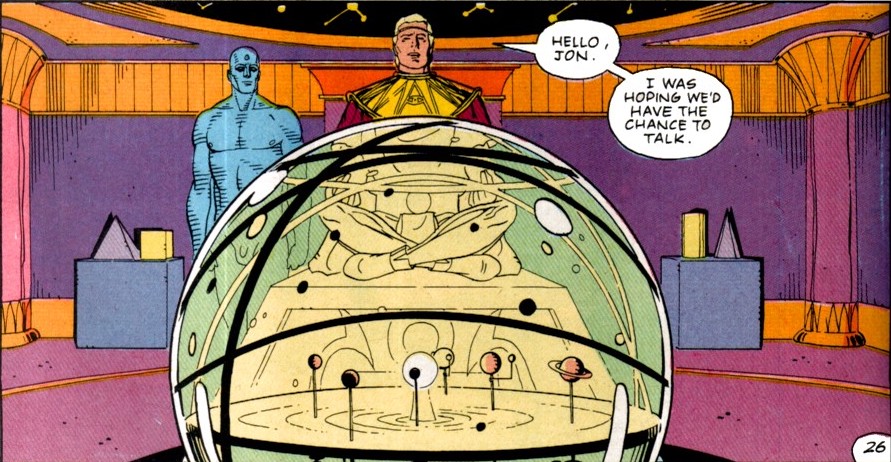 The first time he had changed the world, however, he had essentially been alone. From now on, he had his great rival. By the time that Watchmen had come out, Moore and Morrison had met a total of three times. The first, in 1983, came at a comics mart in Glasgow, where Morrison gave Moore a copy of Bombs Away Batman—Moore writes about the trip (though does not mention Morrison) in Mighty World of Marvel 39. In Morrison’s telling, they met again in 1984 on another trip to Glasgow (“I recommended William McIllvaney’s Laidlaw novels to him”), then again at the same Birmingham convention where he met Brendan McCarthy. Morrison is cagey on precisely how many times they met after that, suggesting broadly that “I also met and spoke with him” an unstated number of times prior to what he describes as “the last time we were in a room together” in 1990 at the Angoulême Festival, by which point Moore had settled on a position of enmity, presumably in the wake of Morrison’s attacks on him in his Drivel column for Speakeasy.
The first time he had changed the world, however, he had essentially been alone. From now on, he had his great rival. By the time that Watchmen had come out, Moore and Morrison had met a total of three times. The first, in 1983, came at a comics mart in Glasgow, where Morrison gave Moore a copy of Bombs Away Batman—Moore writes about the trip (though does not mention Morrison) in Mighty World of Marvel 39. In Morrison’s telling, they met again in 1984 on another trip to Glasgow (“I recommended William McIllvaney’s Laidlaw novels to him”), then again at the same Birmingham convention where he met Brendan McCarthy. Morrison is cagey on precisely how many times they met after that, suggesting broadly that “I also met and spoke with him” an unstated number of times prior to what he describes as “the last time we were in a room together” in 1990 at the Angoulême Festival, by which point Moore had settled on a position of enmity, presumably in the wake of Morrison’s attacks on him in his Drivel column for Speakeasy.

Moore, meanwhile, continues to insist on there only ever having been a single meeting between them, at a dinner following a signing for the Watchmen trade paperback at John McShane’s shop AKA Books and Comics. Even the date of this is difficult; Moore cannot recall what he was signing, while Morrison firmly recalls it being in 1987, but also it being for the slipcased Graphitti edition, which came out in February 1988. Morrison is more likely right about the date than the edition—Moore did a UK signing tour for the Titan Books edition in October of 1987 that stopped by Glasgow. And broadly speaking, Morrison’s account is on the whole more plausible—Morrison would fairly be expected to remember meeting the most prominent writer in British comics rather better than Moore would remember meeting an up and comer, even one that he had previously recommended to Karen Berger. Nevertheless, this is the one meeting that is universally agreed upon, right after the War had begun, but before either party truly recognized that they were embroiled within it; a single point of contact between the two great magi of their age.
For all that one would crave details, they are light on the ground. Moore’s accounts are vague and full of contradictions—he fails to remember what book he was in Glasgow signing or when it was. In one recounting he recalls, “I told him I’d look out for his work. When I saw that work in 2000 AD I thought ‘Well, this seems as if it’s a bit of a cross between Captain Britain and Marvelman, but that’s probably something that he’ll grow out of.’” In the other, part of his epic poison pen “Last Interview,” he expands slightly, saying, “ I can’t say I remember him making any particularly vivid or lasting impression on the occasion, in terms of his appearance. All I can reconstruct at this distance is a blurred image of a soberly-dressed and smallish man with tidy collar-length hair and no remarkable or memorable features beyond a general pastiness of complexion, perhaps four or five years younger than I myself was at the time, although this age-gap seems to have somehow increased since then. As to his conversation, he was quite forthcoming in his praise for my work, telling me how much inspiration it had provided and adding that it was his ambition “to be a comic-writer, like you”. Looking back from my present position, it strikes me that I may have only imagined that there was a comma in that last statement, but at the time I took it at face value. I thanked him for his compliments (as I recall he’d been most effusive with regard to V for Vendetta, despite that might-as-well-call-it-a-rape in the first episode), encouraged him in his efforts as much as I could without having seen any examples of his output, and told him that I’d look out for his work in future.”
Parts of this, at least, jibe—Morrison’s fondness for V for Vendetta is well documented, for instance. Other parts are difficult to reconcile; perhaps most obviously, Moore’s claim to have no idea who Morrison was. Even if one allows that Moore may well have forgotten his previous meetings with Morrison, by October of 1987 he had already recommended Morrison to Karen Berger, and so must have been aware of who he was and have been impressed with some piece of his work. (Zenith Phase I was on the brink of completion by this point as well.) And his subsequent chronology, which has the dustup over Morrison’s Kid Marvelman script following their Glasgow meeting, is flatly impossible—that must have happened before Moore stopped producing Marvelman in August of 1984. Morrison, meanwhile, recalls ”talking to him about becoming a vegetarian – ‘sometimes you can’t live with the contradictions, Grant’…” but gives no other details of the conversation.
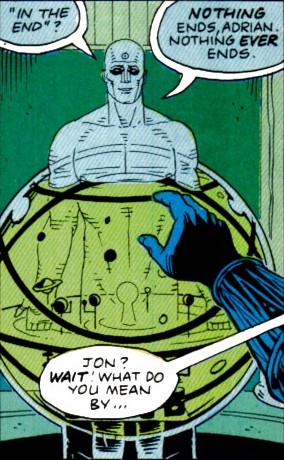 Obviously one is desperate to know more. The only confirmed meeting between the two primary combatants of the War and what we know amounts to some unreliable recollections and a discussion of vegetarianism. Surely, with Morrison already at work on his first DC projects, the discussed more than this. What advice did Moore give the up-and-comer? Did he warn of his disillusionment with fame or DC? How did Morrison respond? Did they talk any about whatever work of Morrison’s had impressed Moore enough to pass his name along to Karen Berger? Did they talk about future works? What insights might Morrison have offered about Big Numbers or Brought to Light? And perhaps most fundamentally, how did they get on? What was their rapport? Presumably, whatever measure of respect at that time existed between them, not entirely well—it’s notable that while Moore recommended him to Berger, Morrison was not involved with AARGH! a year later. But ultimately, there is no way to say. This meeting may sit at the epicenter of the War, but it is a moment where silence is and always will be kept—a wholly private exchange between two men who would spend the rest of their lives atop the battlements, hurling magic down upon the world. In the end, it is fundamentally unknowable, even, it seems, to the two men at its heart.
Obviously one is desperate to know more. The only confirmed meeting between the two primary combatants of the War and what we know amounts to some unreliable recollections and a discussion of vegetarianism. Surely, with Morrison already at work on his first DC projects, the discussed more than this. What advice did Moore give the up-and-comer? Did he warn of his disillusionment with fame or DC? How did Morrison respond? Did they talk any about whatever work of Morrison’s had impressed Moore enough to pass his name along to Karen Berger? Did they talk about future works? What insights might Morrison have offered about Big Numbers or Brought to Light? And perhaps most fundamentally, how did they get on? What was their rapport? Presumably, whatever measure of respect at that time existed between them, not entirely well—it’s notable that while Moore recommended him to Berger, Morrison was not involved with AARGH! a year later. But ultimately, there is no way to say. This meeting may sit at the epicenter of the War, but it is a moment where silence is and always will be kept—a wholly private exchange between two men who would spend the rest of their lives atop the battlements, hurling magic down upon the world. In the end, it is fundamentally unknowable, even, it seems, to the two men at its heart.
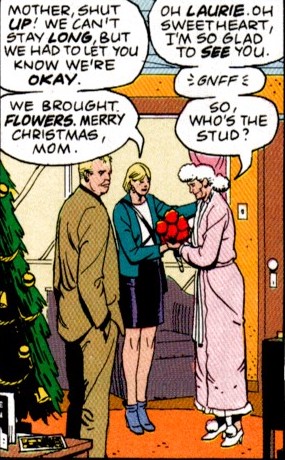 It is at this point that Alan Moore exits the narrative for a time. It is not that the next half-decade is an entirely fallow period for him—he’ll produce some of the best work of his life over them. But the work he produces is almost all in comparatively obscure publications, outside the mainstream comics industry in which he made his name. More to the point, he spends this period as a tangible absence. For those not plugged into industry gossip, the question of where Moore’s next big project for DC was seemed obvious and mysterious. Even for those that were, the way in which the industry reshaped in Moore’s wake made his lack of participation in it palpable, and ensured that when he did return to superhero comics in 1993 it would be an event.
It is at this point that Alan Moore exits the narrative for a time. It is not that the next half-decade is an entirely fallow period for him—he’ll produce some of the best work of his life over them. But the work he produces is almost all in comparatively obscure publications, outside the mainstream comics industry in which he made his name. More to the point, he spends this period as a tangible absence. For those not plugged into industry gossip, the question of where Moore’s next big project for DC was seemed obvious and mysterious. Even for those that were, the way in which the industry reshaped in Moore’s wake made his lack of participation in it palpable, and ensured that when he did return to superhero comics in 1993 it would be an event.
He is not invisible in this period, and much can and will eventually be said about him. It is simply that the story of the mainstream American and British comics industries is not, for the next several years, one about him. What, then, is it? Obviously one thing it is about is Grant Morrison, whose ascent is the next immediate subject of the War. But he does not grow to be the same sort of industry-defining titan that Moore briefly appeared to be in mid-1987.
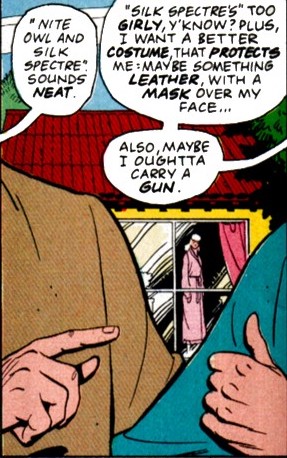 It was also about an industry reacting to what Moore had done. The half-decade after Watchmen would be one of massive change for both American and British comics. The lessons that most people took from Watchmen would be taken to perverse extremes, as comics entered a morbid race to the bottom to see who could tell the most violent and sexualized stories. Meanwhile, the arguments Moore made for creator rights, even as they failed to protect him, would take more root. The result of this would be the first major challenge to the dominance of Marvel and DC in a generation as a bunch of upstart creators split off to form their own company, a development that would eventually precipitate Moore’s return to the industry.
It was also about an industry reacting to what Moore had done. The half-decade after Watchmen would be one of massive change for both American and British comics. The lessons that most people took from Watchmen would be taken to perverse extremes, as comics entered a morbid race to the bottom to see who could tell the most violent and sexualized stories. Meanwhile, the arguments Moore made for creator rights, even as they failed to protect him, would take more root. The result of this would be the first major challenge to the dominance of Marvel and DC in a generation as a bunch of upstart creators split off to form their own company, a development that would eventually precipitate Moore’s return to the industry.
This also, however, led to profound challenges for the industry, which would go through one of the most calamitous boom and bust cycles of its history as Marvel engaged in an act of hubris that nearly destroyed the company and took the industry with it. The practical result would be the collapse of comics into a smaller, more niche medium than it had ever been before. The British industry, meanwhile, would very nearly implode entirely, leaving a smoldering wreckage in which only a few longstanding titles survived. For all that comics seemed on the brink of some sort of explosive growth into the mainstream on the back of things like Watchmen, the truth is that 1987 was one of the last peaks before a long and ugly period for the industry.
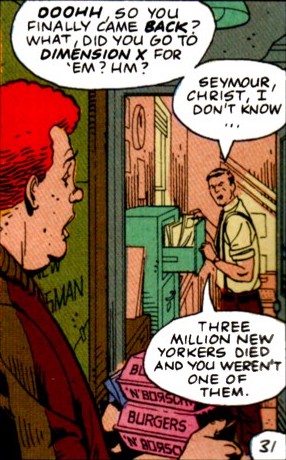 It’s strange, then, that for all DC trumpets Watchmen as “the book that changed an industry,” how little any of this has to do with the comic. Watchmen did not cause the explosion of grim and gritty comics that eventually led to the formation of Image Comics. Indeed, given that Image emerged out of a moment in which artists, not writers, were the superstar figures that sold comics, that lineage can be traced fairly smoothly back to The Dark Knight Returns without ever bringing Watchmen into it. More to the point, as has already been shown, these readings of Watchmen largely misunderstood it, focusing on one strand of its narrative to the exclusion of all else and failing utterly to capture the nuances involved.
It’s strange, then, that for all DC trumpets Watchmen as “the book that changed an industry,” how little any of this has to do with the comic. Watchmen did not cause the explosion of grim and gritty comics that eventually led to the formation of Image Comics. Indeed, given that Image emerged out of a moment in which artists, not writers, were the superstar figures that sold comics, that lineage can be traced fairly smoothly back to The Dark Knight Returns without ever bringing Watchmen into it. More to the point, as has already been shown, these readings of Watchmen largely misunderstood it, focusing on one strand of its narrative to the exclusion of all else and failing utterly to capture the nuances involved.
The truth is that for all its vast importance to the world, Watchmen itself did very little for the medium and industry that published it. The actions that determined its future were taken by people other than Moore and Gibbons, and while some may have been reactions to what people thought Watchmen was, very few engaged with the book itself. For decades, until DC finally stepped up their cannibalization of the book to include an apparent parade of prequel and sequel projects, the book remained a hermetic system, largely closed off from the wider world. Apart from a few pastiches and the like, the number of comics with a direct lineage from Watchmen is surprisingly small. It is entirely possible that its influence on the font Comic Sans (where it was one of the two visual sources consulted, along with The Dark Knight Returns) than on comics themself. For all that comics changed in Watchmen’s wake, it fundamentally wasn’t the twelve issues worth of tight and methodical nine panel grids that are Watchmen that did it.
And yet the comic remains a monolith. If its influence has been understated, this is a testment first and foremost to how much potential there still is within the comic, and how few of Moore and Gibbons’s challenges have actually been met. Nearly thirty-five years later, Watchmen sits as a road not taken—a demonstration of things that comics could do and still haven’t. Instead the comics industry has been content to look at Watchmen and proclaim it an endpoint—a masterwork that can never be transcended, its techniques used to their fullest possible extent. There is no urge or drive to do better. Even those contrarians who proclaim Watchmen not to be the best comic ever—a viewpoint that’s ultimately easily defended—do not then take advantage of its diminished position to outdo it. Instead Watchmen sits upon a pedestal, where it can safely be prevented from having any undue influence, the label “masterpiece” draped upon it like a Do Not Disturb sign.
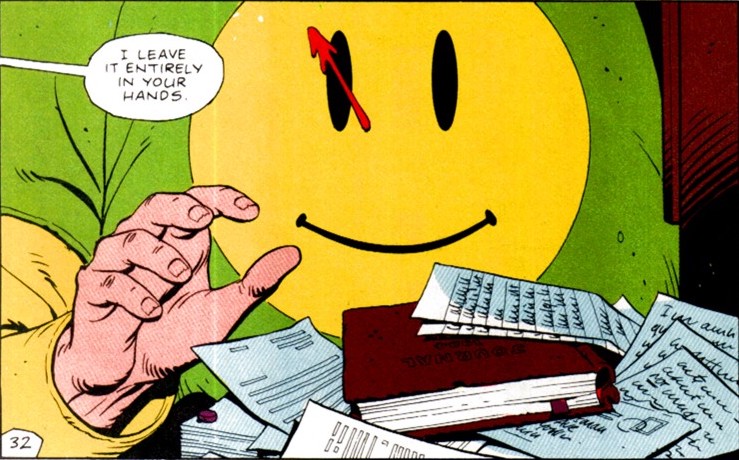 Nevertheless, the potential remains. All it would take, in the end, is for someone to read the widely available collection and decide they could top it. And if that feels like an act of mad hubris well, good. Mad hubris is how you get things done in art. What was it if not mad hubris that made a working class man from Northampton look at the vast edifice of the American comics industry and say “I can outdo them all” in the first place? There’s nothing wrong with mad hubris; certainly it’s preferable to the bland cowardice with which the great works are usually approached. Will it ever happen? It’s impossible to say. But until it does, the challenge that Moore and Gibbons laid down will remain, waiting to be taken up: “Do better.”
Nevertheless, the potential remains. All it would take, in the end, is for someone to read the widely available collection and decide they could top it. And if that feels like an act of mad hubris well, good. Mad hubris is how you get things done in art. What was it if not mad hubris that made a working class man from Northampton look at the vast edifice of the American comics industry and say “I can outdo them all” in the first place? There’s nothing wrong with mad hubris; certainly it’s preferable to the bland cowardice with which the great works are usually approached. Will it ever happen? It’s impossible to say. But until it does, the challenge that Moore and Gibbons laid down will remain, waiting to be taken up: “Do better.”
“’In the end’? Nothing ends, Adrian. Nothing ever ends.” – Alan Moore, Watchmen #12

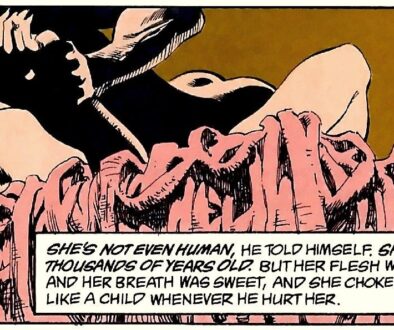
August 3, 2020 @ 10:21 am
8 out of 10 as these sorts of books go. You can still do better.
August 4, 2020 @ 11:25 pm
Well I really enjoyed this. Wonderful ending. Thank you.
August 5, 2020 @ 8:49 pm
Absolutely – thanks from me too. I’ll be interested in the next volume for different reasons, because I am much less familiar with Morrison’s work.
August 5, 2020 @ 3:32 pm
I generally agree with your take on the HBO series, but this is, I think, a little unfair to it and glosses over two of its better notes.
Rorschach’s diaries were read and believed, but they were read and believed by exactly the sort of people who would find a slush pile piece run in the back of a fascist-adjacent tabloid newspaper to be compelling: in short, Nazis. “The Rorschach Diaries” clearly held the same place in that universe that “The Turner Diaries” ended up holding for the same cohort in ours — a joke made explicit in the FBI briefing in the second episode.
Likewise it’s made pretty clear later on that whatever influence Adrian had over the Redford administration in the immediate aftermath of the squid has waned substantially by the time the events of the series commence: Ozymandias’ would-be utopia has spun off a few notable reforms early on but its internal contradictions are straining as other actors (Trieu and the Cyclops) work in the space created by them. Meanwhile Adrian is alone at Karnak and nobody will take his calls…
August 13, 2020 @ 10:26 am
How did Morrison respond? Did they talk any about whatever work of Morrison’s had impressed Moore enough to pass his name along to Karen Berger? Did they talk about future works?
October 23, 2020 @ 3:42 am
I tried to learn it, you share it great, thanks for the article.
March 28, 2021 @ 7:48 am
I wonder if book two will ever see print like the first one …
March 30, 2021 @ 10:48 am
Loving the look of this on the new site.
June 25, 2021 @ 2:30 pm
Thanks for writing these posts. They’re really well written and present a fascinating critical look into details of Watchmen I haven’t considered before, despite having reread the comic many times over the past several years. I was particularly engrossed by some of your comments in earlier posts around Fearful Symmetry and the character of Rorschach.
In this post however, I find myself disagreeing heavily with your characterization of DC’s Doomsday Clock sequel. The series does not come close from a plot, thematic, or technical perspective to the greatness of Watchmen, but the issues you briefly mention do not accurately speak to its failings at a literary level at all. In particular, your framing of the story about “Superman punching Doctor Manhattan in the face” is disingenuous at worst and misleading at best.
Doomsday Clock imitates motifs and conceits that Watchmen had around people only seeing the surface level of reality, or having truth obscured through lenses and what people expect (the specific imagery it uses throughout is that of glass covering vision, but it also shows up in how media is discussed in the comic). The framing of the story as a “battle” between Manhattan and Superman is fed to readers (interestingly enough, this is driven by Manhattan’s viewpoint — he is the narrator who believes that this is how the story must go, given how he believes the universe runs, but of course his placement in the DC universe versus his original place in Watchmen means his perspective is misplaced in certain ways) as this surface level, but it is then subverted in the story itself. This setup is just a facade for the deeper tension and conflict Doomsday Clock tries speaking to, and the ending of the work makes it clear that this is done deliberately. Similar shifts throughout the work (e.g. blood falling down the covers issue over issue, only revealed at the end to be Superman’s flowing cape coming to cover the doomsday clock rather than blood at all) parallel this idea.
This is all just to say that the particular weaknesses you touched on with Doomsday Clock are not what I’d considered the problems with the work. Certainly it has other aspects that betray the thematic and aesthetic sensibilities of Watchmen, but the framing of the conflict of the story is not one of them.